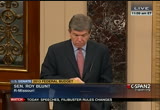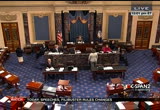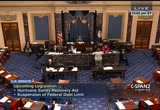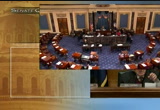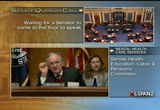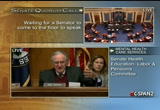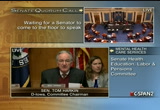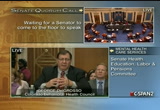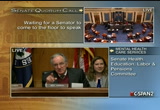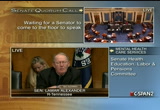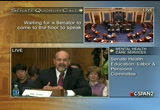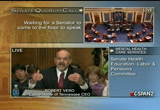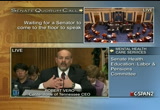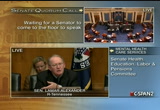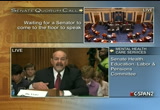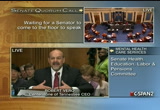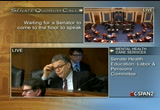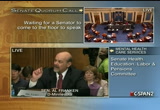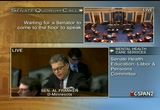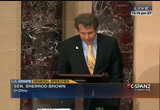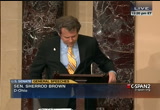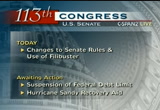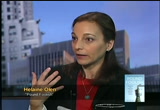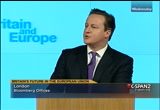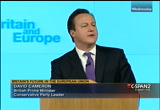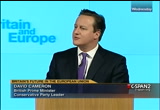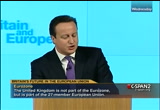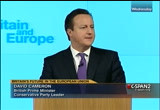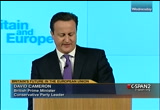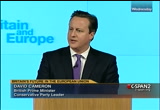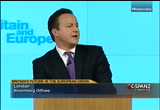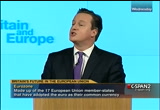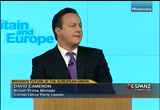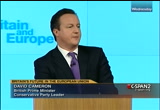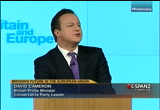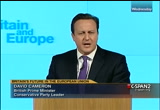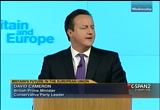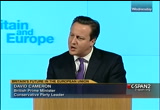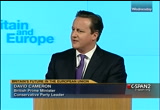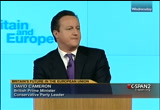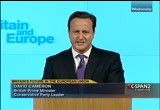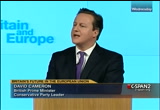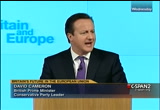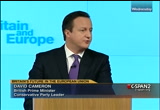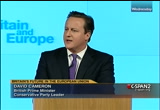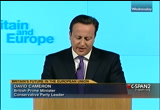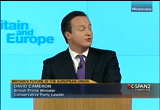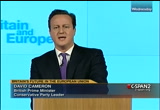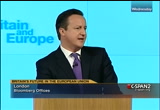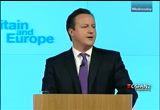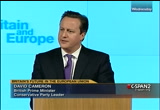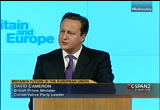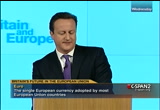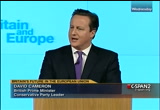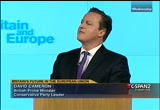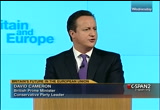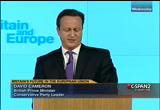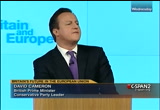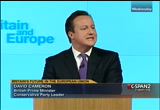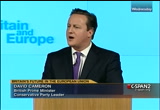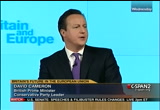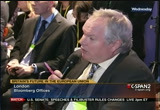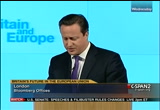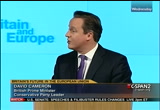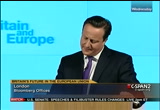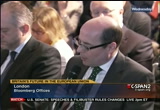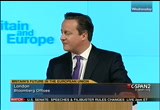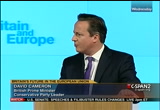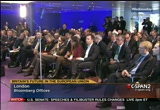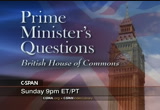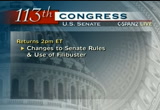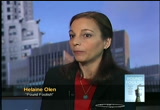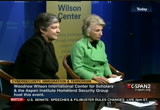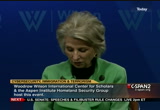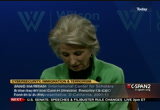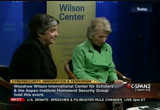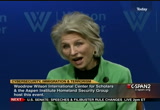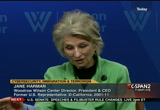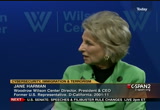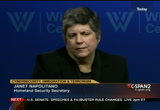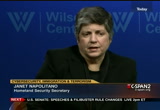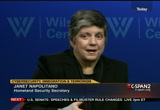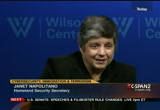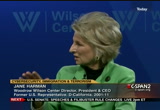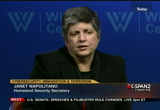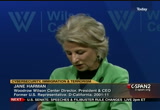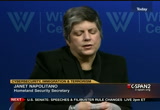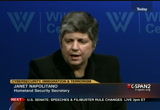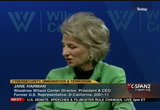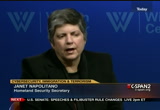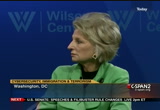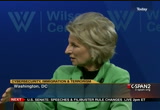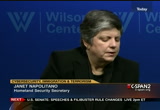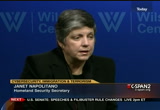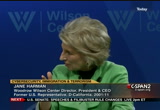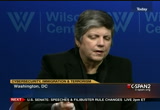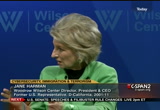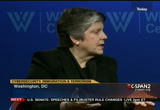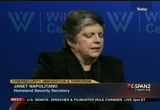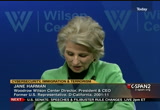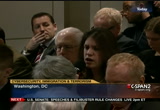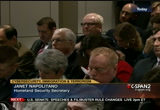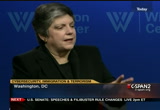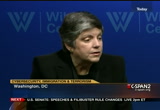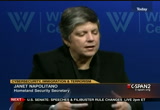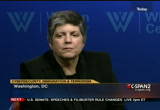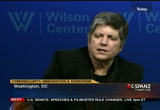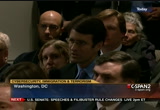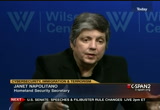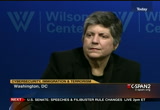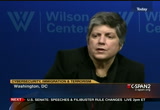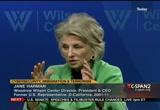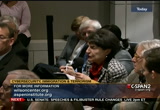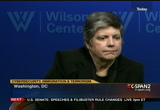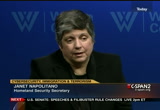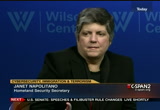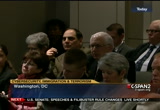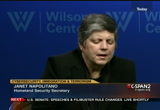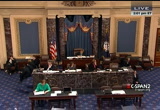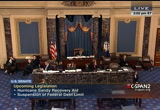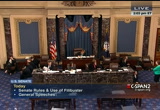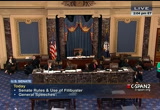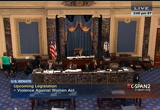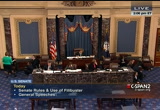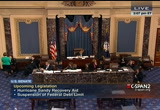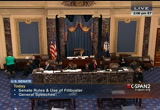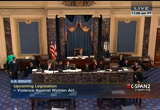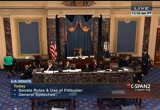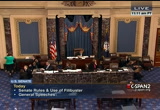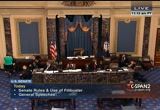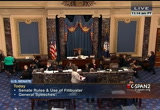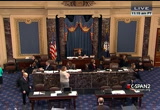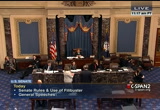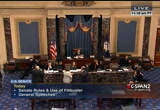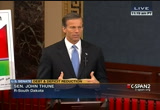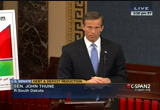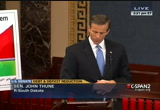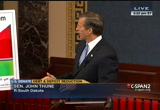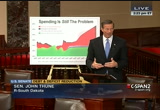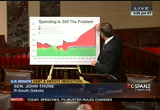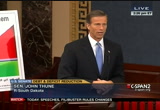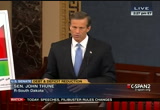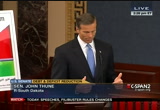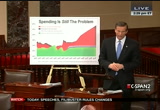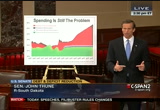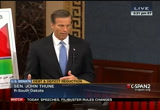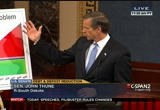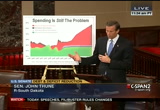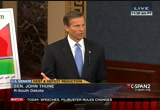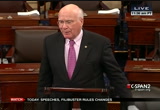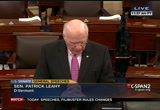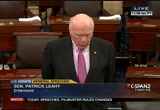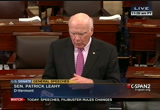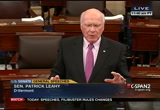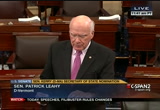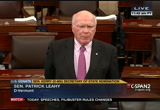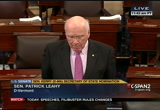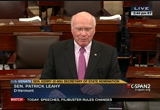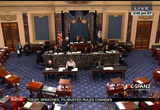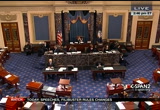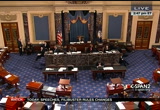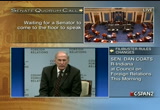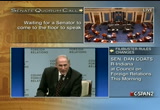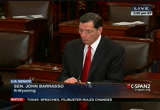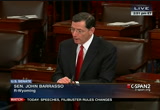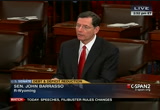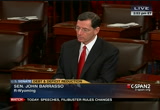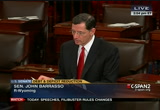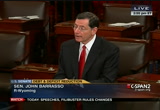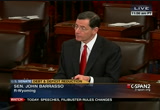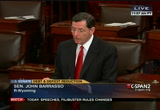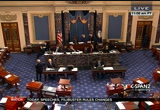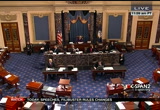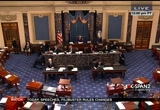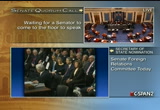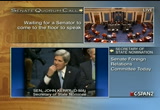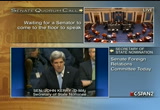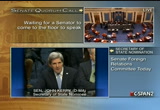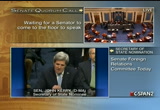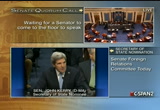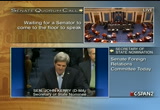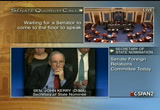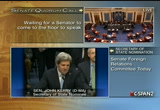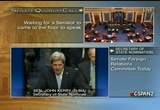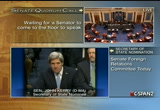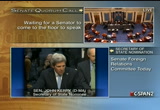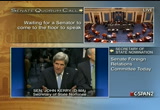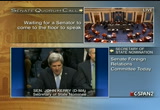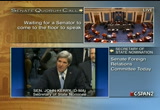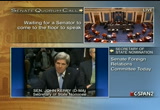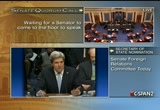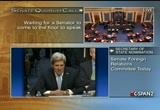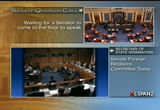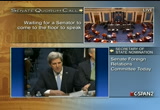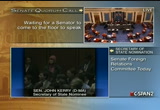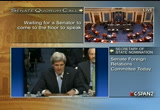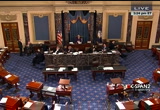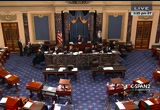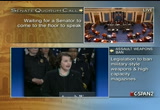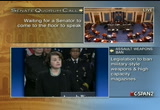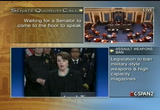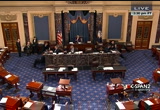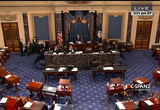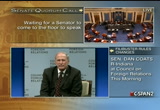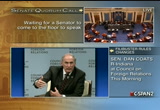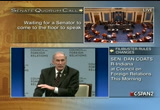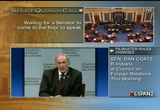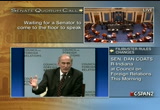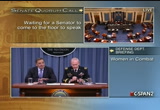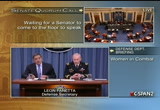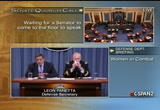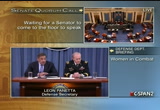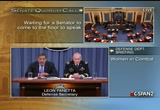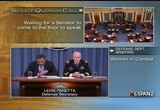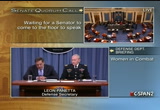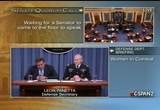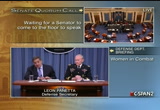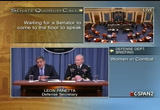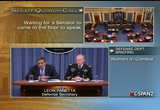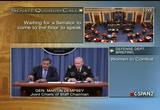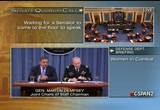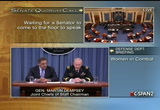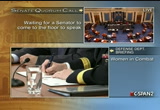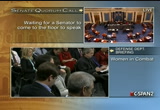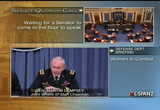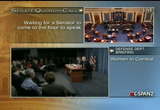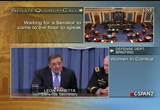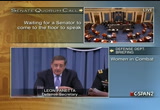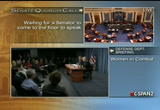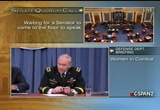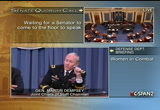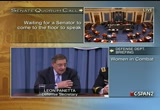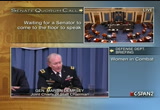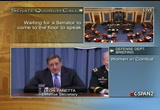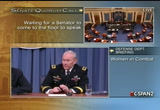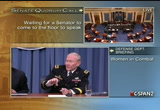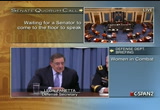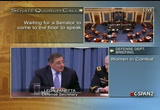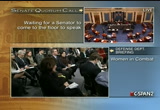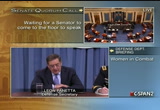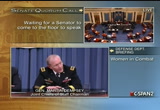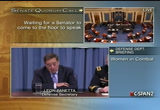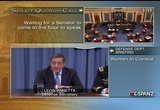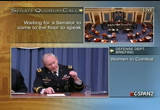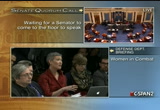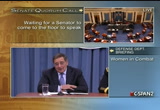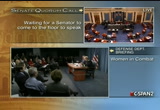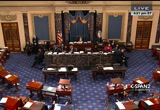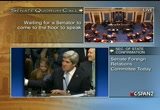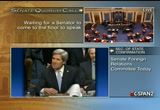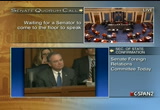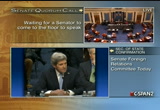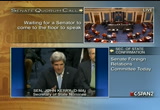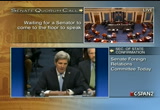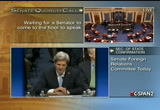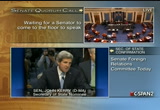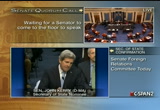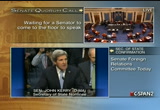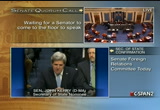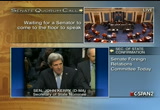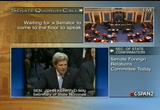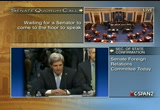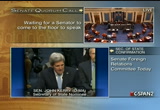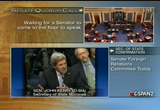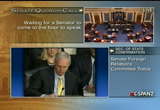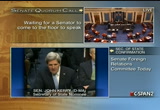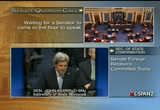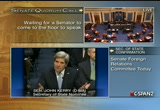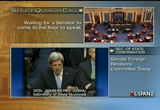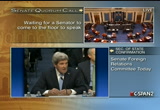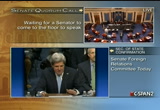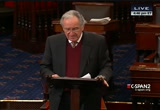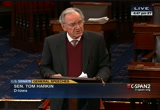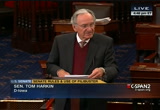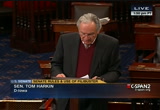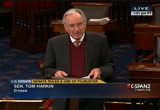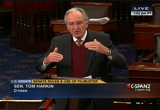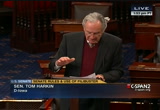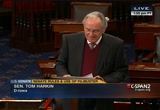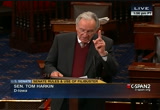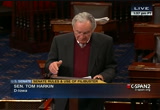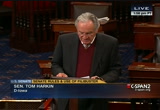tv U.S. Senate CSPAN January 24, 2013 12:00pm-5:00pm EST
12:00 pm
people i work for are even more tired of it than i am. a divided government is a good opportunity to make tough choices. the president will never have more political capital than he has right now. let's take those two things together. let's see what that formula would produce. divided government. republicans and democrats both have to take responsibility. a president with maximum political capital could equal a good and long-term result. i hope that the president and the majority in the senate will get serious about working together and solve the problems that we face as a county. i look forward to being part of that and i am appreciative that the house of representatives has passed legislation that appears to have forced the senate to do its job on a budget for the first time in four years.
12:01 pm
12:18 pm
12:19 pm
mr. brown: thank you, madam president. i rise today to celebrate the career and the calling of a remarkable ohio expan a close friend, reverend dr. lynnwood h. channel berlin. our pasty, woody, and his wife peggy are important to connie and me and to our whole community in lorain. the evangelical lutheran church of america, of which i'm a member, embraces the motto, "god's work, our hands." it means moral imperatives must be the concern of every citizen. in his 31 years of service to the first lutheran church of lorain, ohio, pastor woody has labored for love and for justice. he's been doing god's work, as his wife peggy, supporting those who suffer, celebrating our community's joys, and being concerned with every citizen. pastor woody's been a counselor and a friend to many. his words, his attentiveness, his patient understanding, his gentle encouragement have helped
12:20 pm
members of my home church tackle seemingly intractable problems with poise and with confidence. he supported the first lutheran family through weddings and funerals, through baptisms and celebrations, and i'm especially grateful for his prayers and wisdom over the years. pastor woody has been so valuable to our church and his leadership will be missed as he retires -- as he just retired and as his retirement will be celebrated this coming sunday. my mother, whose faith was especially important to her, passed away four -- four years ago around this time of year. she was in hospice care in her final days, and i -- i -- as my wife connie and i were at her bedside and my brothers -- both my brothers and anne and catherine, their -- bob and charlie were at her bedside over those last six weeks, and one day as i was with my mom, i asked if there was anything i could do to comfort her. she was 88 years old.
12:21 pm
she was just a remarkable woman and -- as a mother and as a wife and as an activist in the community. and she asked notice sing an old lutheran hymn to her, which i did. the song, "beautiful savior." she took my hand in hers after i sang. she said, "that was very nice, sherrod." and then she said, "but, you know, you really do sound better in a group." my mom was right. we all sound better in a group, we all work together in a group and that was exemplified in so many ways by pastor woody's leadership at first lutheran. it's a lesson we all can learn in this body and as we go about our daily lives. madam president, i suggest the absence of a quorum. the presiding officer: the clerk will call the roll. quorum call: mr. brown: madam president? the presiding officer: the senator from ohio.
12:22 pm
12:23 pm
>> on the filibuster. will have more details on that and we expect the senate to gavel in shortly. we will have live coverage when the senate resumes here on c-span2. >> personal-finance starts in the 1930s with sylvia porter. it's a spinoff of the 1930s. the 1930s are known for everything from the hard economic times of the 1930s. easy everything from alcoholics anonymous developed in the 1930s to the pole in, think they can get rich to various social activist movements. fascism and communism. there's this whole fulcrum going on out there. there's personal-finance out of this over a period of years. our goal is to educate people for that great depression will never happen again. it's very much in the wake of its time. and i get that we can teach people certain skills. if they learn the skills we will all be okay. >> the dark side of the
12:24 pm
personal-finance industry with helaine olen saturday night at 10 on c-span2. look for more booktv online, like is on facebook. >> what's the best training for policeman? >> the best training you can get to become a really good police officer is to understand what it's all about. i will say that to the day i die. you learn to develop forces. you learn how to use intelligence information. you learn how to leverage relationships in a community at that is key. people in the 20 trust you, they will tell you when to our things that are happening that are not yet crimes. so that you can intervene. they will tell you all about how to go about doing it. i really learned the most of my career from those relationships. >> from high school dropout and single mother t to the youngest police chief in washington, d.c. history, more with cathy lanier sunday night at eight on c-span's q&a.
12:25 pm
>> the senate in recess until 2:00. members meeting over lunch to talk about the proposed agreement on filibuster rules changes. live coverage senate when they resume. in london british prime minister david cameron pledged to have a referendum on britain's future and the european union is his conservative party selected about in the next turn. he outlined a framework for new relationship with europe which included more flexibility, democratic accountability and giving power back to member states. this is 45 minutes. >> good morning and i'd like to thank bloomberg very much for hosting me this morning. this morning i want to talk about the future of europe. but first, let us remember the past. 70 years ago, europe was being torn apart by its second catastrophic conflict in a generation. a war which saw the streets of european cities strewn with
12:26 pm
rubble. the skies of london led by flames night after night. and millions dead across the world in the battle for piece and liberty. as we remember their sacrifice, so we should also remember how the shift in europe from war to sustained piece in about. it didn't happen like a change in the weather. it happened because of determined to work over generations. a commitment to friendship and i resolve never to revisit that dark past, a commitment epitomized by the police a treaty signed 50 years ago this week. after the berlin wall came down, i visited that city and i will never forget it. the advancing checkpoints, a sense of excitement about the future. the knowledge that a great continent was coming together. healing those wounds of our history is the central story of the european union.
12:27 pm
what churchill described as the twin marauders of war and tyranny have almost entirely been banished from our continent. today, hundreds of millions well in freedom, from the baltic to the adriatic, from the western approaches to the aegean. and while we must never take this for granted, the first purpose of the european union, to secure piece, has been achieved and we should pay tribute to all those in the european union, alongside nato, who made that happen. but today them overriding, the main purpose of the european union is different. not to in piece, but to secure prosperity. the challenges come not from within this continent but from outside. from the surging economies in the east and the south. now, of course, a growing world economy benefits us all, but we should be in no doubt that a new
12:28 pm
global race of nations is underway today. a race for the wealth and for the jobs of the future. the map of global influence is changing before our eyes. and these changes are already being felt by the entrepreneur in the netherlands, the worker in germany, the family in britain. so i want to speak to you today with urgency and frankness about the european union and how it does change, both to deliver prosperity and to retain the support of its peoples. but first, i want to set out the spirit in which i approach these issues. i know that the united kingdom is sometimes seen as an argumentative and rather strong-minded member of the family of european nations. and it is true that our geography has shaped our psychology. we have the character of an island nation. we are independent, forthright,
12:29 pm
passionate in defense of our sovereignty. we can no more change this british sensibility than we can train the english channel. and because of this sensibility, we come to the european union with a frame of mind that is more practical than emotional. for us, the european union is the means to an end. prosperity, stability, the anchor of freedom and democracy both within europe and beyond her shores, not an end in itself. we insistently ask how, why, to what end? but this doesn't make us somehow un-european. the fact is that ours is not just an island story. it is also a continental story. for all our connections with the rest of the world, for which we are mightily proud, we have always been a european power and we always will be. from caesar's legion to the napoleonic wars, from the
12:30 pm
reformation, the enlightenment and the industrial revolution to the defeat of nazism. we have helped to write european history, and europe has helped to write ours. over the years, britain has made her own unique contribution to europe. we have provided a haven to those fleeing tyranny and persecution. and in europe's hardest hour, we help to keep the flame of liberty i like. across the continent, inside the symmetry, live the -- and silent cemeteries, like the hundreds of thousands of british servicemen who gave their lives for europe's freedom. in more recent decades we played our part in tearing down the iron curtain and changing the entry into the eu of those countries that lost so many of their use to communism. and contained in this history is the crucial point about britain, about our national character, about our attitude to europe. britain is characterized not just by its independence but
12:31 pm
above all, by its openness. we have always been a country that reaches out that turns its face to the world that leads the charge in the fight for free trade and against protectionism. this is britain today, as it's always been. independent, yes, but open, too. i never want us to pull up the drawbridge and retreat from the world. i am not a british isolationist. but i do want a better deal for britain. but not just a better deal for britain. i want a better deal for europe, too. so i speak as a british prime minister with a positive vision for the future of the european union. a future in which britain wants, and should want, to play a committed and active part. now, some might then ask, why raise fundamental questions about the future of europe when
12:32 pm
europe is already in the midst of a deep crisis? why raise questions about britain's role when support in britain is already so than. now, there are always voices sang don't ask the difficult questions. but it is essential for europe, and for britain, that we do because there are three major challenges confronting us today. first, the problems in the euro zone are driving fundamental change in europe. second, there is a crisis of european competitiveness as other nations across the world sort ahead. and third, there is a gap between the eu and its citizens which has grown dramatically in recent years. and which represents a lack of democratic accountability in consent that is, yes, felt particularly acutely here in britain. if we don't address these
12:33 pm
challenges, the danger is that europe will fail and the british people will drift towards the exit. i do not want that to happen. i want the european union to be a success. and i want a relationship between britain and the european union that keeps us in it. that is why i am here today. to acknowledge the nature of the challenges we face, and to set out how i believe the european union should respond to them. and to explain what i want to achieve for britain and its place within the european union. so let me start with the nature of the challenges we face. first, the euro zone. the future shape of europe is being forged. there are sensors questions that will define the future of the european union, and the future of every country within it. the union is changing to help fix the currency, and that has profound implications for all of us, whether we are in the single currency or not. now, britain is not in the
12:34 pm
single currency, and were not going to be. but we all need the eurozone does the right governance and structures to secure a successful currency for the long-term. and those of us outside the eurozone also need certain safeguards to ensure that for example, our access to single market is not in any way compromised. and it is right that we begin to discuss those issues now. second, while there are some countries within the eu that are doing pretty well, taken as a whole, europe's share of world output is projected to fall by almost a third in the next two decades. this is the competitiveness challenge. much of our weakness in meeting it is frankly self-inflicted. complex rules which restrict our labour markets a natural occurring phenomenon. just as excessive regulation is not some external plague has been visited on our businesses. these problems have been around
12:35 pm
for too long, and progress in dealing with them has been far too slow. as chancellor merkel has said, if europe today accounts for just over 7% of the worlds population, and produces 25% of global gdp, it is currently financing 50% of global social spending, and then it's obvious that will have to work very, very hard to maintain its prosperity and its way of life. third, there is a growing frustration that the eeo is seen as something that is done to people rather than acting on their behalf. and this frankly is being intensified by the very solutions that are required to resolve the economic problems. people are increasingly frustrated that decisions taken further and further away from them means their living standards are slashed through enforced austerity or the taxes are used to bail out governments on the other side of the continent. we are starting to see this in
12:36 pm
the demonstrations on the streets of athens, magid and world. we're starting to see it in the parliaments of berlin, helsinki and the hague. and yes, of course, we are seeing this frustration with the eu very dramatically here in the united kingdom. europe's leaders have a duty to hear these concerns. indeed, we have a duty to act on them. and not just to fix the problems in the eurozone. for just as in any emergency you should plan for the aftermath as well as dealing with the present crisis, so, too, in the midst of the present challenges we should plan for the future, and what the world will look like when the difficulties and the eurozone have been overcome. now, the biggest danger to the european union comes not from those who advocate change, but from those who denounce new thinking as heresy. in its long history europe has experience of heretics who turned out to have a point. and my point is this.
12:37 pm
more the same on the secure a long-term future for the eurozone. more th of the same will not see the european union keeping pace with the new powerhouse economies. more of the same will not bring the european union any closer to its citizens. more of the same will just produce more of the same, less competitiveness, less growth, fewer jobs. and that will make our countries not stronger but weaker. that is why we need fundamental, far-reaching change. so let me set out my vision for a new european union, fit for the 21st century. it is built on five principles. and the first is competitiveness. at the core of the european union must be, as it is now, the single market. britain is at the heart of that single market, and most remains a. but when the single market remains incomplete and services, in energy, in digital, the very
12:38 pm
sectors that are the engine of a modern economy, it is only half the success that it could be. it is nonsense that people shopping online in some parts of europe are unable to access the best deals simply because of where they live. so i want completing the single market to be our driving missi mission. i want us to be at the forefront also of the transformative trade deals with the u.s., japan, india as part of the drive towards global free trade. and i want us to be pushing to exempt europe's smallest entrepreneurial companies from more eu directive. they should be the officials, they should be do tasks that get european officials up in the morning and keep them working late into the night. and so we urgently need to address the sclerotic, ineffective decision-making that is holding us back. that means creating a leaner, less bureaucratic union, relentlessly focused on helping its member companies compete.
12:39 pm
in the global race can we really justify the huge number of expensive peripheral european institutions? can we justify commissions decade ever larger? can we carry on with an organization that has a multibillion pound budget but not nearly enough focus on controlling spending and shutting down programs that haven't worked? and i would ask this, when the competitiveness of the single market is so important, why is it in an environment council, a transport council, and education council of not a single market council? now, the second principle should be flexibility. we need a structure that can accommodate the diversity of eu's members, north, south, east, west, large, small, old and new. some of whom are contemplating much closer economic and political integration. and many others including britain they would never embrace that goal. i except, of course, that for
12:40 pm
the single market to function we need a common set of rules and a way of enforcing them. that we also need to be able to respond quickly to the latest developments and trends. competitiveness demands flexibility, choice and openne openness. or europe will fetch up in a no man's land between the rising economies of asia and the market-driven north america. the eu must be able to act with the speed and flexibility of a network, not the cumbersome rigidity of a block. we must not be weighed down by an insistence on a one size fits all approach which implies that all countries want the same level of integration. the fact is they don't and we shouldn't assert that they do. some will claim that this offends a central tenet of the eu's founding philosophy. i would say it merely reflects the reality of the european union today. 17 members are part of the
12:41 pm
eurozone. 10 or not. 26 european countries are members of schengen, including four outside the european union, switzerland, norway, liechtenstein, and iceland. to eu countries, britain and ireland, have retained their border controls. some members like britain and france are ready, willing and able to take action in libya or malley. others are accountable with the use of military force. let's welcome the diversity instead of trying to snuff it out. let's stop all this talk of two speed europe, a fast lanes and slow lanes, of countries missing trains and buses, and consigned the whole weary caravan of metaphors to a permanent citing. instead, let's start from this proposition. we are a family of democratic nations, all members of one european union, whose essential foundation is the single market rather than the single currency.
12:42 pm
those of us outside the euro recognize that those in it are likely to be to make some big institutional changes. and by the same token, the members of the eurozone should accept that we, and, indeed, all member states, will have changes that we need to safeguard out inches and strengthen our democratic legitimacy. and we should be able to make those changes, too. now, some will say this will unravel the principle of the eu, and you can't pick and choose on the basis of what your nation needs. but i would argue that far from unraveling the eu, this will infect bind its members more closely because such flexible, willing cooperation is a much stronger glue than compulsion from the center. let me make a further heretical proposition. the european treaty commits the member states to lay the
12:43 pm
foundations of an ever closer union among the peoples of europe. this has been consistently interpreted as applying not to the peoples but rather to the states and institutions, and it's been compounded by a european court of justice that has consistently supported greater centralization. we understand and but the right of others to maintain their commitment to this goal. up for britain, and perhaps for others, it is not the objective. and we would be much more comfortable if the treaty specifically says so. free and those who want to go further, faster to do so without being held back by the others. so to those who say we have no vision for europe, i say we ha have. we believe in a flexible union of free member shapes hoosier treaties and institutions and pursue together the ideal of cooperation. to represent and promote the values of european civilization in the world, to advance our
12:44 pm
shared interests by using our collective power to open markets, and to build a strong economic base across the whole of europe. and we believe in our nations working together to protect the security and diversity of our energy supplies, to tackle climate change and global poverty, to work together against terrorism and organized crime, and to continue to welcome new countries into the european union. this vision of flexibility and cooperation is not the same as those who want to build an ever closer political union, but it is just as valid. my third principle is that power must be able to flow back to member states, not just away from them. this was promised by european leaders at laeken a decade ago. it was put in the treaty but the promise has never been fulfilled. we need to implement -- we need
12:45 pm
to implement this principle properly. so let us use this moment as the dutch prime minister has recently suggested, to examine thoroughly with the eu as a whole should do and should stop doing. in britain we've already lost our balance of competences review, to give us an informed and objective analysis of where the eu helps and where it hampers. and let us not be misled by the fallacy that a deep and workable single market requires everything to be harmonized, to thank her after some unattainable and infinitely level playing field. countries are different. they make different choices. we cannot harmonize everything. for example, it is neither right now necessary to claim that the integrity of the single market, or full membership of the european union requires the working out the british hospital doctors to be set in brussels be respective of the jews of british parliamentarians and practitioners. in the same way we need to examine whether the balance is
12:46 pm
right in so many areas where the european union has legislated including on the environment, social affairs and crime. nothing should be off the table. my fourth principle is democratic accountability. we need to have a bigger and more significant role for national parliaments. there is not come in my view, a european demos. it is national part much which are and will remain the true source of her that the credit legitimacy and accountability in the european junior. it is to the bundestag that angela merkel has to answer but it is through the greek parliament that antonius so morris has to pass is governments austerity measures but and it is to the british parliament that i must attack on the eu budget negotiations, on the safeguarding our place in the single market. those are the parliaments which instill proper respect, even fear, international leaders. and we need to recognize that in the way the eu does business.
12:47 pm
my fifth principle is fairness. whatever new arrangements are enacted for the eurozone, they must work fairly for those countries inside it or outside. that would be of particular importance to britain. now, as i said, we're not going to join the single currency. but there was no overwhelming economic reason why the single currency and the single market should share the same boundary, any more than the single market and schengen. our participation in the single market and operability to help set its rules is the principal reason for our membership of the european union. so it is a vital interest for us to protect the integrity and fairness of the single market for all of its members. and that is why britain has been so concerned to promote and defend the single market as the eurozone crisis stops to rewrite the rules, fiscal court nation and banking union.
12:48 pm
so these five principles provide what i believe is the right approach for the european union. so now let me turn to what this means for britain. today, public disillusionment with the eu is at an all time high. and there are several reasons for this. people feel that the eu is heading in a direction that they never signed up to. they resent the interference in our national life by what they see as unnecessary rules and regulation. they wonder what the point of it all is. put simply, many ask why can we simply have what we voted to join, a common market? they are angered by some legal judgments made in europe that impact on life in britain. now, of course, some of this antipathy about europe in general really relates, of course, to the european court of human rights rather than the eu. and britain is leading european efforts to deal with this. and there is indeed much, much more that needs to be done on
12:49 pm
this front. but people also feel that the eu is not heading for a level of political integration that is far outside britain's comfort zones. they seek treaty after treaty changing the balance between member states and the eu, and they know they were never given us a. they had referendums promised, but not delivered. they see what's happened to the euro and they know that many of our political and business leaders urged britain to join at the time, and they haven't noticed many expressions of contrition. and they look at the steps that the eurozone is taking and they wonder what deeper integration for the eurozone will mean for a country which is not going to join the euro. the result is that democratic consent for the eu in britain is now wafer thin. some people say that pointing this out is irresponsible, that it creates uncertainty for business and puts a question mark over britain's place in the
12:50 pm
european union. but the question mark is already there, ignoring it is not going to make it go away. in fact i would argue quite the reverse. those who refuse to contemplate consulting the british people would come in my view, make our exit more likely. simply asking the british people to carry on accepting a european settlement over which they had little choice is the path to ensuring that when the question is finally put, and at some stage it will have to be, it is much more likely that the british people were reject the european union. that is why i am in favor of having a referendum. i believe in confronting this issue, shaping it, leading the debate. not simply hoping that difficult of situation will go away. now, some argue that the solution is, therefore, to hold
12:51 pm
a straight in that referendum now. i understand the impatience of wanting to make that choice immediately. but i don't believe that to make a decision at this one is the right way forward. either for britain or for europe as a whole. a vote today between the status quo and leaving would be an entirely false choice. now while the eu is in flux and we don't know what the future holds and what sort of du will emerge from this crisis is not the time to make such a momentous decision about the future of our country. it is wrong to ask people whether to stay or go before we've had a chance to put the relationship right. how can we sensibly ask the question in or out before he had a chance to ask a big stick question, what is it exactly are we choosing to be in or out of? the european union that emerges
12:52 pm
from the eurozone crisis is going to be a very different body. it will be transformed perhaps beyond recognition by the measures needed to save the eurozone. when the choice comes it will be a real one. a real choice between leaving or being part of a new settlement in which britain shapes and respects the rules of the single market but is protected by fair safeguards, and free of the spirit is regulation that damages europe's competitiveness. a choice between leaving or being part of a new settlement in which britain is at the forefront of collective action on issues like foreign policy and trade, and when we leave the door from the open to new members. a new settlement subject to the democratic legitimacy and accountability of national parliaments where member states combined in flexible cooperation, respecting national differences and not always
12:53 pm
trying to eliminate them, and in which we have proved that some powers can, in fact, be returned to member states. in other words, a settlement which would be entirely in keeping with the mission for an updated european union i have described today. more flexible, more adaptable, more open, fit for the challenges of the modern age. now, to those who say, and there are those who say it, that a new settlement can't be negotiated, i would say listen to the views of other parties in other european countries arguing for powers to flow back to european states. and also look to at what we've achieved already. we have ended the obligation for britain to bail out the eurozone members. we have kept britain out of the fiscal compact. we have launched a process which turns an existing justice and home affairs powers. we have secured protections on banking union and reform common
12:54 pm
fisheries policy. so we're starting to shape the reforms that we need now. now, some of these things will not require treaty change. but i agree to with what president barroso and others have said. at some stage in the next few years the eu will need to agree on treaty change to make the changes needed for the long-term future of the euro, and to entrench a diverse, competitive, democratically accountable europe that we seek. i believe the best way to do this will be in a new treaty, so today i add my voice to those who are already calling for th this. now, my strong preference is to enact these changes for the entire european union, not just for britain. but if there is no appetite for a new treaty for us, if there's no appetite for a new treaty for us, for us all, then, of course, britain would be ready to address the changes we need in a negotiation with our european
12:55 pm
partners. so the next conservative manifesto in 2015 ask for a mandate from the british people for a conservative government to negotiate a new settlement with our european partners in the next parliament. it will be a relationship with the single market at its heart. and when we negotiated that new settlement, we will give the british people are referendum with a very simple in or out choice. to stay in the eu -- to stay in the european union on these new terms, or come out altogether. it will be an in-out referendum. legislation will be drafted a for the next election. and if a conservative government is elected, we'll introduce the enabling legislation immediately and pacify the end of that year. and we will complete this negotiation and hold this referendum within the first half of the next parliament.
12:56 pm
it is time for the british people to have their say. it is time for us to settle this question about britain and europe. now, i say to the british people, this will be your decision. and when the choice comes, you will have an important choice to make about our country's desti destiny. now, i understand the appeal of going it alone, of charting our own course. but it will be a decision we will have to take with cool heads. proponents on both sides of the argument when he to avoid exaggerating their claims. of course britain could make her own way in the world, outside the eu, if we chose to do so. so could any other member state. but the question will have to ask ourselves is this, is that the very best future for our country? we will have to wait carefully where true national interest lies. alone, we would be for you dig our own decisions, just as we
12:57 pm
would be freed of our solemn obligation to defend our allies if we left nato. but we don't leave nato because it's in our national interest to stay and benefit from its collective defense guarantee. we have more power and influence, whether in the meeting sanctions against iran or syria, or promoting democracy in burma, if we can act togeth together. if we leave the eu, we cannot of course leave europe. they will remain for many years our biggest market, and forever our geographical neighborhood. we are tied by a complex web of legal -- a complex web of legal commitments. hundreds of thousands of british people now take for granted the right to work, live or retire in any other eu country. even if we pulled out completely, decisions made in the eu would continue to have a profound effect on our country. but we would have lost all our remaining vetoes and our voice in those decisions. we would need to weigh up very carefully the consequences of no
12:58 pm
longer being inside the eu and its single market, as a full member. continued access to the single market is vital as i said, absolutely vital for british people and for british jobs. since 2004 britain has been the destination for one in five of all inward investment into europe and being part of the single market has been absolutely key to that achievement. now, there will be plenty of time to test all the arguments thoroughly, in favor and against the arrangement that we negotiate. but let me just deal with one point that we hear a lot about. there are some who suggest we could turn ourselves into norway or switzerland, with access to the single market but outside the eu. that would that really be in our best national interests? i admire this country and they are friends of ours, but they are very different from us. norway sits on the biggest energy reserve in europe, and has a sovereign wealth fund of over hype hundred billion euros.
12:59 pm
and while norway is part of the single market and pace for the principle, it has no say at all in setting its rules. it just has to influence its directors. the swiss have to negotiate access to the single market sector by sector. excepting eu rules, over which they have no say, or else not getting full access to the single market, including in key sectors like financial services. the fact is if you join an organization like the european union, there are rules. you will not get what you want, but that doesn't mean that we should leave. not if the benefits of staying and working together are great greater. we would also have to think carefully, too, about the impact on our -- on our influence at the top table of international affairs. there is no doubt that were more powerful in washington, in beijing, in delhi because we are a powerful player in the european union. that matters for british jobs, for british influence, for
1:00 pm
british security. it matters to our ability to get things done in the world. it matters to the united states and other friends around the world which is why many tell us very clear that they want britain to remain in the european union. so we should think very carefully before giving that position up. if we let the european union, it would be a one way ticket, not a return. so we'll have time for a proper, reasoned debate. at the end of that debate you, the british people, will decide. and i say to our european partners, frustrated at some of them no doubt are by britain's attitude, work with us on this. consider the extraordinary steps with the euro zone members are taking to keep the euro together, steps which a year ago would have seemed impossible. it does not seem to me that the steps which would be needed to make britain, and others, more comfortable in our relationship with the european union are inherently so outlandish or so unreasonable.
1:01 pm
and just as i believe that britain should want to remain in the eu, so the european union should want us to stay. because a european union without britain, without one of europe's strongest powers, a country which in many ways invented the single market and which brings real heft to europe's influence on the world stage which plays by the rules, which is a force for liberal economic reform, that would be a very different kind of european union. and it is hard to argue that the eu would not be greatly diminished by britain's departure. let me finish today by saying this. i have no illusions about the scale of the task ahead. i know that there will be those who will say the vision i have outlined will be impossible to achieve. that there's no way our partners will cooperate, that the british people have set themselves on a path to inevitable exit, that if we aren't comfortable being in the eu after 40 years, we never will be.
1:02 pm
but i refuse to take such a defeatist attitude, either for britain or for europe. because with courage and conviction i believe we can deliver a more flexible, adaptable and open european union in which the interests and ambitions of all its members can be met. with courage and conviction i believe we can achieve a new settlement in which britain can be comfortable and all our countries can thrive. and win that referendum comes, let me say now that if we can negotiate such an arrangement, i will campaign for it with all my heart and all my soul. because i believe something very deeply. that britain's national interest is best served in a flexible, adaptable and open european union, and that such a european union is best with britain in it. now, over the coming weeks, months and years, i will not rest until this debate is one. for the future of my country,
1:03 pm
for the success of the european union. and for the prosperity of our peoples and for generations to come. thank you very much indeed. [applause] >> before going to my own national parliament, we have time for a few questions. first, adam bold. >> prime minister, how did the leader who said he didn't want to spend his time banging on about europe, what signals have you had from your european colleagues suggesting that they are favorable to the renegotiation, and could you be more specific on areas you are trying to renegotiate on? >> first of all there's been a very big change in europe, as i argued in my speech.
1:04 pm
a single current has been driving a huge process of change. someone who will remain nameless said to me when i became prime minister, one thing you won't have to worry about is treaty changes. we've already had two that we have accepted, the one we rejected and i don't think -- i believe in prime minister for two patches. this debate is happening now. this change in europe is happening now. the question is, our politicians britain sticking their head in sand and let this debate happen, or will they get out there, leader, shape it and went for britain in our national interest? what i set out today is a program to ensure britain's national interest, to reset our relationship with your, put that to the british people in a referendum, is an active forward leaning, good for britain and the alternative i think is to let events shape us and i'm not content to let that happen. in terms of conversations with european partners, i've had a number of conversations in recent days and recent weeks. i think there's an understanding for change is required in your.
1:05 pm
there's an understanding that britain is arguing for more open, flexible competitive year. i think is a welcome for the fact that we are saying these are changes that should be, therefore, all for the european union. but obviously the we some tough debates, some tough negotiations to come. the my experience in europe if your single-minded about what you want, if you work in the great of a european union and have reasonable relations with your partner, you can get things done. >> [inaudible] >> oh, specific. first of all nothing is off the table. i'm putting very clear the single market at the heart of relationship but i wouldn't underestimate the balance of the competent review we're going to carry out over the coming months and the years before the election, that will be in order of what europe should do less, and what countries should do more. next question. >> thank you very much, prime minister. you yourself say if britain can
1:06 pm
negotiate a new arrangement it is not the logic of your position that there's every chance that britain will not be able to negotiate and arranged it with other european partners and, therefore, the possibly is you end up campaigning for a no and that referendum you're talking about? you have to accept that possibility spent i'm an optimist rather than a pessimist. if, number one, i'm told is if there's going to be treated change, and i said we've had three proposed in the last two and a half years and you have president of the commission, the fourth presidents report, and many others in the eurozone singh treaty change is necessary. so i think that deals with that if. if britain can secure changes, i'd argue for changes that all of europe would benefit from, but in previous negotiations, we've already demonstrated we've been able to repatriate powers including coming out of the bailout fund. so i'm optimistic, and engaged positive, and achieve what is necessary in britain's interest
1:07 pm
in. >> thank you. if there was a conservative government with a referendum be held at the park no matter what stage negotiations are at? if there isn't, if there is another coalition on the table will this be a dealbreaker? >> very simple answer to as i said clearly here this referendum will be held in the first half of the next parliament. and look, i am fighting for and argue for a conservative majority government the next election to i'm confident we can achieve that but let me be absolutely clear, if i'm prime minister this will happen. finally, let's have made. nick robinson. >> thank you prime minister. you couldn't have been clear, if you can get a better deal, you say that you will vote yes. do you not owe it to the british
1:08 pm
people and, indeed, to europe to be equally clear, if you cannot get a better deal, are you saying that you would note no for britain to get out of europe? if you touch the question which just it, are we entitled to issue that you want people to think that but you are scared to say it's? >> i would argue on that very directly, who goes into a negotiation hoping and expecting to fail, that might be the approach you take the gun is not the approach i take. i go into negotiations hoping, believing and expecting to succeed. and for all the reasons i have given today i think there's every chance to say there is the need for treaty change in your. this massive changes taking place. there's a huge agenda here in terms of more open, flexible your. but in the end the choice will not be from the politician. the choice will be for the british people. the fact is we are not comfortable with the state of our membership today. it does need to change. i'm setting out a path for how we change that, how we put that to the british people, and in
1:09 pm
the end they will decide. but do i believe britain's future is better off inside to change your opinion? yes, i do and that is what i will be fighting for. finally, tom bradley spent your argument is clear enough. but i still don't really understand what it is you really don't like. the changes you want in a single market can surely be achieved exactly as europe is. and just finally, if you turn out to be the british prime minister to take us out of europe and that sure legacy to this country, how are you personally going to feel about the? >> first of all let me answer -- i think in a speech there's a huge about a detailed, actually about things we want to change. that are safeguard for the single market. there is this order for what europe does and shouldn't do. that are the changes on issues like ever closer union with think it's been at the heart of one of the problems that britain and british people have dealt with our membership for so long. which i think there's a huge agenda there, to take action on.
1:10 pm
look, i want to be the british primary to the gets the right answer for britain on these sorts of issues. take the issue of the future of our united kingdom. many people say to me well, obviously you just have to ignore what is happening in scotland, and the fact that i said no. if the scottish people have voted for an s. as mp government the west mr. barletta should be constructed. we should trust the people, given that choice. that is why there will be a referendum on whether scotland states and the united kingdom, and i passionately believe that it showed and i hope that it will. and i think it's the same in some ways on this issue. you can put your head in the sand, you can pretend that some of this issue will go away, and that somehow if this will turn out all right. i think that is simply incredible. there's a huge debate underway about britain's place in europe. there's massive change coming in terms of the european union and single currency.
1:11 pm
the right answer, the bold patch, the answer international interest is to get out there, shake the debate, when for britain, put it to the british people and secure our economic or political future. that is what we should be doing to that is the path is set up, and it's the right course for britain. can i think you all again very much for coming to this early hour? can i think bloomberg for hosting us, and a few for your questions as well this one. thank you very much, indeed. [applause] >> we have more british politics sunday night on c-span during prime minister's question from the house of commons. prime minister cameron will take questions from members on his plan for a referendum on whether the united kingdom should remain in the european union and how he would vote in that reverend. prime minister's questions at nine eastern and pacific on c-span. >> you are watching c-span2 with politics and public affairs.
1:12 pm
weekdays fisher live coverage of the u.s. senate. on weeknights watch key public both events, and every week in the latest nonfiction authors and books on booktv. you can see past programs and get our schedules at our website, and you can join in the conversation on social media sites. >> some senate news this afternoon to majority leader reid and minority leader mitch mcconnell have reportedly reached a deal to change senate with the previous of the filibuster. the senate is currently in recess so senators can't explain the filibuster agreement to their party senators. political reporting that the agreement to limit republicans use of the filibuster would ensure the minority party has the right to offer amendments on the floor. the senate will reconvene at 2 p.m. eastern and we will have live coverage on c-span2. spent a week from today, thursday january 31 is the confirmation hearing for chuck hagel to be the next defense secretary. he served two terms as
1:13 pm
republican senator from nebraska. confirmation hearings will be live on c-span thursday january 31 starting at 9:30 a.m. eastern. >> personal-finance stars as we know in the 1930s with sylvia porter and it's really a way out of this help -- self-help business of 1930s. indicators are now for everything from the hardest times of 1930s easy everything from alcoholic anonymous developed in the 1930s to napoleon -- helping the poor to get rich to very social activist movements, fascism and communism to the new do. there's this whole fulcrum going on at the. and she tells personal-finance adout of this over the years, ad her goal is to educate people so this great depression will never happen again. buddies really much away, and i do that we can teach people certain skills and if they learn new skills they will all be okay. >> the dark side of the
1:14 pm
personal-finance industry with helaine olen saturday night at 10 on after words on c-span2. look for more booktv online, like this on facebook. >> homeland security secretary janet napolitano today called on congress' overhaul the country's immigration laws and create a pathway to citizenship for people in the country illegally. she spoke of the woodrow wilson center about the holistic the department's agenda and the president's second term. secretary napolitano was introduced by jane harman who is the president of the wilson center. >> good morning. >> good morning. >> i'm jane harman, director and president, ceo of the wilson center, and i want to a special welcome the chairman of the board, outboard, my boss, member of, and the members of the world trade council and alliances. it's an honor to cohost this event with the aspen institute,
1:15 pm
and to welcome ambassadors from bulgaria, canada, costa rica, the czech republic, and arab states, and maybe others. unlike the washington monument or the lincoln memorial, the wilson center is a living memorial to our 20th presiden president. who studied congress, this center was chartered by congress in 1968, and we claim to offer a safe political space for independent research and open dialogue that lisa actionable ideas for the broad policy community. that also happens to be the call of the aspen institute's homeland security advisory group, which i am former secretary of homeland security michael chertoff co-chaired. we are a bipartisan group of -- experts, some of whom are within
1:16 pm
eyesight, who meet periodically including this morning to discuss issues and problems in depth and make recommendations for the current secretary who happens to be sitting right he here. as a former nine term congresswoman, i served on all the major security committees in the house, intelligence, armed services, homeland security. and i'm passionate about these issues. and for the two years i have been at the world trade center we've held programs and hosted major national conversations on the toughest of these issues. for example, in april of 2012 john brennan asked to speak here to describe the legal -- around the obama administration drone program. the very thoughtful public discussion we had that day may have helped generate the administration simply be published counterterrorism playbook. we also hosted a national conversation last fall with
1:17 pm
cyber czar keith alexander, senator susan collins and anthony romero who is head of the aclu, and how to bring the public into the very difficult discussion on cyber. we addressed a range of issues and will cover some of this again today from privacy to the role of the department of homeland security. all of the participants in that national conversation, i know our secretary does, too, cyberattacks pose a potential catastrophic threat to u.s. infrastructure. i met janet napolitano of long ago. she knows what's coming. when she was a young associate in a phoenix law firm. she claims that she had a perm, but i have no memory. [laughter] since then she has been a u.s. attorney, ma attorney general of arizona, governor of arizona,
1:18 pm
first woman to chair the national governors association. obviously, i had a great influence over her. and we worked closely together when i chaired the house homeland security subcommittee, and she made one of her first field visits at home and secretary to the port of los angeles, which is the nation's largest container port. a topic i will discuss with her for part of this morning, including cybercom immigration, terrorism and disasters, all impact the port of l.a. and other critical infrastructure throughout the country. leaving dhs is a nearly impossible job because its jurisdiction merges 22 agencies and departments, its organization does not parallel the committee structure in congress, and the threats against our country -- to name just a few of the modest issues that confront janet napolitano
1:19 pm
every day. and yet she soldiers on and has made significant progress. special kudos, my friend, to you and your department for the extraordinary performance during and after superstorm sandy. what a sea change, no pun intended, from the response to katrina. before engaging in a conversation let me say word about one of the person who is supposed to be here. i'm not sure that she is here. is terry here? yes. i want to make a special shout out, whose mother was killed on 9/11, and whose voice and courage have inspired congress and me, and the executive branch, both in the bush administration and the obama administration, to act. she is the director of the bipartisan policy center's homeland security project, and her movie, killing in the name,
1:20 pm
did an extraordinary amount to expose the fact that much of al qaeda's poor is against in a sense muslims. there's lots of big shots and mission, and one of them, a great favorite of mine, bill webster just walked in, but weighing in at 100 pounds, carrie may actually be the heavyweight. so welcome, carrie. welcome to all of you, and welcome to janet napolitano. [applause] >> are you embarrassed? oh, good. that was my intention. okay, madam secretary, let's start with cyber. you have said that a cyber 9/11 is not an if, but a win. what would a cyber 9/11 look like and how soon could it happen? >> it could happen imminently. what would it look like? it could take many forms, but let me just give one that may
1:21 pm
come to mind, which is what happens when the electric grid goes down. you saw that during sandy, and you see how that impacts everything from the ability to heat homes, to the ability to pump gasoline, to the ability to of lighting at night, everything. so when we look at the nation's critical infrastructure, and where it is foldable, one of the phone bill this is cyber and the network cyber world that we live in. so we have been trying to get this word out, the secretary of defense have, i have, the attorney general has, the chair of the joint chiefs have. look, we shouldn't wait until there is a 9/11 in the cyber world. there are things we can and should be doing right now that if not prevent would mitigate the extent of damage that would because. well, as most do in this audience now, legislation is pending in congress.
1:22 pm
several versions, but it still. i know we're all shocked to hear that installed. so far as i know the white house will soon release an executive order to add authorities that don't exist, but what come a perfect world, what authority do we not have come with authorities does dhs need, and what role is and should dhs play in keeping our country safe from a catastrophic cyber attack? >> cyber is one of the areas were thing the department has evolved most in the last few years. now we have a 24/7 watch center. we have a significant population of workers are actually in the field. we have agreements with the department of defense and an essay on how we utilize their technical expertise. really in the cyber world our self, bob mueller, head of the fbi and keith alexander, head of
1:23 pm
the nsa, have worked very closely together to develop playbooks, and they are -- who has what roles and what responsibilities in different types of scenarios. nonetheless, what we know in supporting states is that our ability to dictate, prevent and mitigate is assisted materially based on whether we know something has occurred. so the idea of sharing, getting those, particularly when they infiltrated entity is part of the nation's critical infrastructure, that everybody else relies upon, is key. the ability to be able to undertake certain mitigation measures is key. the ability to have the freedom to hire personnel to the department without some of the restrictions of the civil service is key, because these,
1:24 pm
are areas which at one is competing for. so legislation that would have the effect of clarifying, making sure those roles and responsibilities are set forth in the statute. form should include and dealing with -- >> why don't you explain what that is? >> well, i'm going to let you explain it. spent finish your sentence. >> that is a concept i'm not sure everyone -- anyway. an executive order can be so much, the legislation can be critical. there are areas where part of our job is to educate the congress on what is going on up there, educate the public. we say cyber and edwards eyes glaze over. i can see. i can see in some of you. [laughter] but nonetheless the clarion call is here. we need to be getting with this very urgently and imminently, it
1:25 pm
has attacks are coming all the time. they're coming from different sources. they take different forms, but they are increasing in seriousness thing you mentioned civilian space, and i don't know how well everywhere all -- however it understands the fact that there is defense space, the forgotten space, government space. but then there is dot com and dot org. that's the overwhelming majority of space but a lot of our infrastructure is operated by the private sector. so that piece of this puzzle has to be in. homeland has jurisdiction uniquely what the pentagon doesn't, or the nro doesn't, over the civilian space. and that is a reason maybe not well enough understood why homeland has to be an independent player, yet many in
1:26 pm
the private sector, some of the business interests have been saying that homeland does not have the competence to do this job well. do you agree with that? >> no. [laughter] spent i think that's what they call -- that's a leading question. >> one of the things we deal with all the time at dhs is perception doesn't match reali reality. and so perception is of how things work, you know, five years ago, seven years ago and the like. perception needs to catch up with reality. because point of fact, the department has moved light-years ahead in terms of its cyber capabilities come and we continue to move in that direction. president obama has continued to ask congress for the resources that we need in order to do that. so when we talk about the interaction with the private pre sector, which we did in a number of other areas already, what we are talking about linking together the private sector that that part of it controls our
1:27 pm
core critical infrastructure with our overall statutory responsibility to help protect the nation, infrastructure. and when we talk about linking those things together from a security perspective, we are not talking about a regulatory overlay. what we are talking about is how do you take part of our country that is infrastructure, that everybody has to depend on, and make sure that we have our security interest, the public good taken into account. >> well, changing the subject, to an uncontroversial subject like immigration. president obama said on monday quote our journey is not complete until we find a better way to welcome the thriving, hopeful immigrants who still see america as a land of opportuni opportunity. into bright young students and engineers are listed on workforce rather that expelled from our country. you were governor of arizona
1:28 pm
when the bush 43 administration, bipartisan comprehensive immigration bill fails. are we ready for another moment where we can pass such a thing. and we still need a bill like that, and what efforts will you and your department make to try to help this president put immigration reform act of the top of each in a? >> i think the president is very clear that immigration needs to move forward and it's one of those areas where, you, the business interest and faith-based interest and advocacy groups and others now clearly recognized that the system we have doesn't match the needs that we have come as an immigrant country. so we need to do a couple of things. most importantly we need to reform the way people can become citizens of the country.
1:29 pm
we need to reform our -- we need to deal realistically and practically with those already in the country, and quite frankly, one of the strong man arguments i hear is we can do with immigration until we close the ports. the plain fact of the matter is that border numbers haven't been as low since the early 1970s. we have really changed that aspect of the border. more manpower, more technology. we now have air cover across the entire border. we are getting to the point of diminishing marginal return. what would really help us is if we could improve illegal migration system. so that people come through ports eventually we never they are, we know where they are going to if necessary we know how long they are entitled to state. ..
1:30 pm
>> they have to try to get out of the partisan gridlock in which it's been in the last decade, really. >> yeah, i don't want to out him, but steve is four rows back, and he remembers, i'm sure, the disappointment when the bill failed. your predecessor was one of the point persons on it and had to sit in the cabin by himself for the weekend after it failed he was so discurnlgedded, but it's -- discouraged, but it's a big deal and affects the whole country.
1:31 pm
>> right. >> i'm hopeful we make progress. last immigration question. you worked with the mexico government, and one that is based on risk segmentation and the latest technology. please update us on how that's going. >> it's going well. you know, mexico is one of the leading trading partners, and quite frankly, we need a port infrastructure that allows goods and commerce to flow smoothly through. we're working on projects like preinspections so trying to take pressure off the physical border and do things before goods get there, working with mexico on trusted shipper and trusted traveler programs. we're working on doing risk-based analysis of cargo before it even arrives at a port of entry so i think that border, which is the most frequently traversed border in the world, really can serve and will serve as a model for how you manage a
1:32 pm
long, complicatedded, complex border think the economic advantage of both sides. >> well, we have issues along the canadian border, and we have them at our ports. one of the things i'm proud of from our service in congress, which i did with former representative dan lundgren, the safe ports act, same idea. layer security as far out as possible at the point of em bar cation. we checked what was in containers, and then they were secured so they were not tampered with on the high seas, and by the time they got here, there was not a slow down in letting commerce travel to the u.s. because the ports are big feeders of economic -- >> oh, sure, the port of los angeles, look at the ripple effects when the cargo stops. it ripples throughout the whole country. one of the things, though, you raise a good point, our department's name is homeland security, but in point of that, a lot of our work needs to be
1:33 pm
done internationally, and it is done internationally. we know of folks in 75 countries around the world. we are negotiating agreements all the time with other countries on how we do these things. how we make agreements for oh cargo will be handled and sealed and inspected. how we make agreements on how passengers can come. all of those things, i think, creates an international security net in a way that enables us to look forward to, i think, greater ease in the commercial side and on the travel side than we've ever had before. >> well, that's, obviously, urgent given some of the threats that have almost been pulled off against our country. >> right. >> by people with bombs in their shoes and ect.. >> right. >> and bombs in other body parts, and making sure we know, and we have not done it perfectly, who is boarding our airplanes, and we have a net to catch them prior to that is
1:34 pm
critical. staying on the subject of terrorism and counterterrorism. there's a lot of unrest in mali. everyone's reading the newspaper, and also in algeria too. why does that affect your department and your jurisdiction? >> well, when you think about the world today, you know, we have a post-arab spring world. we have situations -- >> not sure it's post. >> arab spring into summer, maybe? but the developments there, the developments across north africa have huge implications for the united states. just to give you one example, any time you have areas where there's no rule of law and where there is no government, you have a place, nature in a vacuum
1:35 pm
where al-qaeda or al-qaeda type affiliates can take root, and where we have those places, they seed things. they seed things on the internet. they seed plots that can come into western europe. they contemplate plots against the united states, and just because we have not had a major terrorist attack in the homeland in the last few years does not mean that we can seal ourselves off from the risk of such an attack so we live in a world where what happens in north africa and countries people may never have heard of before really can have a direct impact whether you live in washington, d.c. or los angeles or any place in between. >> and the flip side of that is we also have home grown democracies. >> right. >> and so-called lone wolves,
1:36 pm
people not acting in concert with others, but when we deal with american citizens inside our country, there is a different grid that applies. there is our constitution and our fourth amendment and a subject that vexes me enormously in congress, couldn't get very far, and i know it's one you think about too. is where that line is between freedom of expression which is protected by our first amendment and that means freedom to express views that probably none of us in this room would approve of, that's protected, and then there's a line, and then it is expression of these that cause violence behavior, actions that are violent, which are not protected. interceding at that line is the hard part, so what's the answer? >> i think one of the advances we have made is to take the
1:37 pm
concept of homeland security and recognize that through better information sharing and training, we can actually empower state and local law enforcement, really, to be the eyes and ears on the ground. we created a network of fusion centers to help us with that information sharing. we've created a whole training curriculum, and we are looking at past cases of home grown violence to educate us about, okay, what were the early indicators and behaviors, and what did we see with, say, for example, norway, remember that attack? there are lessons to be learnedded there. there are lessons to be learned from aurora, colorado. there are lessons to be learned from the attack in newtown. there are lessons to be learned to all of these events, and the lessons are what are the early indicators, behaviors, clues
1:38 pm
that someone is moves beyond free speech issues into actually wanting to commit an act of violence. it is an art. it is not a science. it requires judgment because we're very cognizant of privacy, civil liberties, and the rest, but i think we have and are in the process of creating a much better weaving together of state and local law enforcements with what we can do with the federal level. >> and i agree with that, and i would just point out that under the 2004 intelligence reform law, which grew out of many of the failures on 9/11 and in the past because of a hundred pound body behind it, we created a privacy and civil liberties commission. that's in the law. it's taken forever to get people appointed, and it still is not fully functioning, but, actually, it finally has members. the point of that exercise was at the front end of policymaking
1:39 pm
to nick -- to make sure we factor in privacy and civil and have appropriately tough security measures. it's not a zero-sum game. get more of both orless of both. right. you nailed it. you have toy -- you have to think about privacy issues in the beginning. they are not an afterthought. dhs, i think we were the first department in the obama administration to actually have a presidentially appointed privacy officer. we actually have a large privacy office, and they are at the table, and they are helping us. you know, it's very practical stuff. if we collect information, what kind can we collect? how can we store it? who can we share it with? for how long? for what purpose is it used? there are privacy implications about that. a number of other examples how we embed privacy considerations into the work that we do, and how important it is, and, you
1:40 pm
know, our country is strong because we protect civil liberties and we protect security, not because we protect one of them and not the other one. >> these are our values, that's correct. >> right. time question. you and i are both in a field dominated by men of the as i mentioned, i served on all the major security committees in the congress, and i now serve on this state department punishment gone cia, and dni external boards. you are the first secretary of homeland security who happens to be a woman. what advice do you have to young women thinking about getting into the security field? >> get at it. [laughter] it's fascinating of the it's important. it's challenging. you can serve the public in a way that you can't serve in any other regard so i would just say get at it. >> here, here. anyone disagree with that? if so, leave the room.
1:41 pm
[laughter] we're now turning to questions from you. please identify yourself, wait for the mic. there are some in an overflow room, and so we'll take some of those in writing. i think that's how this is going to work. we have about a full 20 minutes. i just do want to mention because i see most of them here, and i'm afraid i will no introduce them if i don't read the whole list, but there are members of our advisory group in the room including most of these people in the room, charlie allen, stuart baker, richard, jim, p.j. crowley, steve hadley, and i don't think walter isakson is here. brian michael jenkins, names you all know. phil mudd, eric olson, dan, guy
1:42 pm
swan, evan wolf, it's an amazing list. you know, it is a tribute to you, my friend, because all these people care about homeland security and value the opportunity to help advise. that's great. questions? right here. red jacket. please identify yourself. >> hi, rachel oswald, global security news wire. secretary, can you tell us how close your department is to meeting congress' mandate that 100% of foreign cargo be scanned when it comes into the country? you're operating under extension due up, i believe, to close in summer 2014, and, also, could you tell us about any projects at the dndo office is working on? any new nuclear technology? >> i looked into the issue thoroughly, as did my
1:43 pm
predecessor, secretary chertoff. it's one of those things as we learn to manage risk, mandates like that sound good, but in point of fact, are extrouter their -- extraordinarily expensive when there's better and more efficient ways to accomplish the same result. we have a number of things around the world. that's why i mentioned the international negotiation agreements and the like. those are the diendz -- kinds of things that layered together may get -- may make us confident that we are doing what we -- all that can be done to minimize the risk that dangerous cargo will enter the united states, and with respect to dndo, one of the achievements last year is a significant one, was to finally implement and begin implementing a nuclear
1:44 pm
architecture for the safety of the country, and i don't want to go into the new technologies because you don't want to share some of that information, but there are constantly developing technology in that arena. >> right here. >> [inaudible] >> wait for the microphone. >> i'm a consultant in the national security arena. there was an editorial the other day on the tsa preprogram that argues it was inequal, and therefore should be abolished. those of us who spend our lives on airplanes appreciate it a lot. does this sort of argument threaten the program? >> no. in fact, i appreciate that, but here's the thing. i just talked about managing riskment one of the big developments in the department over the last few years is to say, well, we don't need to treat all cargo the same.
1:45 pm
we don't need to treat every passenger the same. we got started, it was the only thing to do, and now we can begin to really look at risk or travelers we need to know more about versus chose who have already given us information. at we have been able, technologically to link systems with the airlines, as we have been able to have airports installed for the right types of equipment, you have seen the precheck program, the domestic program, already expand, i think, the number i recently have the 8% passengers in it. our goal is to get it half of pages having some kind of precheck capability within the next two years so i think that really deals with the argument about being unequal. we're sensitive to the argument, but our goal from a security stand point is to try to take pressure off the lives so that
1:46 pm
we can focus on those we need to know more about. >> in the front row. >> i'm the czech ambassador. madam secretary, how do you see the future of legislation in the area of cybersecurity, and how can you get around with the presidential executive order only? >> the executive order helps on some things, clarifying roles and responsibilities in some respects by way of example. setting forth how we interact with the private sector by others, but it cannot create any kind of overreaching statutory authority. it can't also -- it cannot also amend current statutes to better equip us to deal with the cyber threats so the eo can go so far, the executive order can go so far, but congress will need to
1:47 pm
act. i was pleased to see that there was a place holder bill introduced yesterday. i think this is an area that the more congress understands, the more willing they are to really take this up. i think this is an interest of new chair of the house homeland security committee who worked on the bill last year. my hope and efforts will be towards moving legislation this year. >> dawn in the back. >> thank you. madam secretary, i'm don with the wilson center. i've wondering whether you might give us a brief explanation of what prompted the withdrawal of the full body scanners in airports and what we might expect replacement. i'm an artificial hip guy so i appreciate them. >> well, not withdrawing all the scanners, but withdrawing one type of scanner. those scanners are very valuable. why? because aviation remains a threat. we don't put scanners in airports for our health in that sense. well, it would be kind of, you
1:48 pm
know, we want to interfere with travelers going to airports, but that's not their purpose. their purpose is to deal with a known threat. what's the known threat? the threat is that our adversaries, al-qaeda and its affiliates, remain focused on aviation, be it cargo or passenger, and our -- and are increasingly sophisticated about the types of things they want to do so the scanners which better enable us to see nonmetallic explosive material are essential. there was a privacy concern raised with one type of scanner because it had, like, a smudged photographic image opposed to what congress now requires a software that gives you a stick figure that points out anomalies. one type of scanner was able to get that software in. the other type has been up able to do that. they have been unable to meet that requirement. we are removing those.
1:49 pm
actually, the company that manufactures them is removing them at their expense, and we will substitute in the other models so the scanners will still be in the airport. >> over there in the back. right here, with your hand way up, right there. >> thank you. ted from the council of foreign relations. i wanted to ask when we might see from dhs releases of data that would be helpful in the coming immigration reform reformment one example is visa overstay rates helping those in congress who want to extanned -- extend the process, and it is a massive problem, big weakness in border security. the second would be some data on the effectiveness of the consequence programs at the border. now, most of the people that are apprehended by the border patrol go through a consequences program. >> that's right. >> are they effective in
1:50 pm
reducing recidivism and preventing people from trying again, a problem for many years? pieces of data that would be helpful in the debate, and a lot of that is probably available at this moment to dhs. >> right, and we are preparing some of that data in the likelihood that comprehensive immigration reform coming up so visa overstay rates b and what we have done to go back now and to identify visa overstays in the last 18 months is significant. i mean, one of the things we have discovered is a lot of individuals, so-called visa overstays, actually left the country. we just didn't have a good record of that. one of the other things we're adding is a very enhanced bigraphic type of exit system which will be implemented over the next year that will give us a better sense of who is actually leaving. with respect to consequence delivery, that's right. past the time when we just do
1:51 pm
turn aways at the border. if you're found, you go into -- we have different models of consequence, along the border, but we're keeping track of that, and in particular for recidivism rates, and so our consequence delivery program, i think, will have data available for the cir debate. >> that would be helpful, but i talked to folks on the hill, and there's a lot of mistrust about that. it would be extremely helpful. >> yeah, i agree. one of the things we need to do is educate members about what really is happening on immigration and at the borderment again, the perception and reality are two different things. >> the woman in the back by the window. >> hi, i'm an intern here with the wilson center, and i have a question regarding the drone attacks. the targeted killing, raise a
1:52 pm
lot of questions, one of them is about a due process about the constitution. president obama addressed that it is not equal to legal process, but we know that it won't last long. i wonder what kind of legislations they are working on, and do you think there will be a change in the first year of the second term. thank you. >> on drones? >> on targeted killing. you asked -- >> i think that what we have done 1 use a technology now available to focus on and target those seeking to do harm to the united states. there is a legal infrastructure
1:53 pm
around it within the federal government executive branch. i think that there will be reiteration in this next year, but let's not forget al waki was one of the key perpetrators in forming an attack against the united states. i have to add something there as a former member of congress. i mentioned in my opening remarks that john brennan came here to explain that there is a legal frame work. >> right. >> i also mentioned that the administration, i think probably led by him, is developing a counterterrorism play book, which is going to be more specific about what this frame work is. i'm aware, and i think we're all aware that some in congress want to see the legal meme randoms
1:54 pm
prepared by the justice department explaning the policy around targeting american citizens abroad. it's a careful policy, but nonetheless, explaning it. congressments to see the memos. it's in a classified setting that the moment -- memos should be released, and they should be able to review them. there needs a public discussion of not all the details, not the targeting set, but of the general subject, and so i think i'm pleased you raised it, the kind of thing the wilson center does. we want to have conversations around tough security issues, and this is a -- i appreciate the fact that you, at the wilson center, raised the question. it was not a planted question. thank you very much. [laughter] other questions. right here.
1:55 pm
>> thank you, madam secretary. good morning. good morning, mrs. harman. i'm the back base dore -- i'm the ambassador of costa rica, and we are doing well on the security and economic front. we are trying to fight institutions with what a lot of other countries fight with, armed forces, and we're in the conduit neighborhood, the drug market going from colombia to mexico, and the world is becoming consumed with organized crime, drug, and trafficking all interlinked. your department, and i'd like to thank you, working very hard with us, and i appreciate it a great deal. i want your assessment on progress made. are you optimistic, realistically deflated or how do you feel things are going and will go in the future?
1:56 pm
>> in my judgment, we need to have a western hemisphere regional approach with respect to central america, you know, you read in the press about violence rates in mexico, and point of fact, the rates in places like honduras are higher and among the highest in the world. you're right that the drug route comes right through there. it's an area where we can and should work together with central america in terms of trying to have capacity building and try to shut that drug network down. >> jan? >> jan mcdonaldson on the wilson council. you warn of cyber 9/11. what can we as individuals do to
1:57 pm
be better prepared in the event of it? >> well, i think one of the things, every individual can do, and, i mean, every individual on the net is a potential opening. the internet is a great thing. this is empowering the world, makes knowledge available. it's a phenomena. we just want to make sure it's safe and free, and so that requires everybody to have responsibility, have good cyber habits, make sure you use the phrase "stop, think, connect," pushing that into young kids who are on the net, you know, at an every younger age. with respect to your question and every individual practicing, good cyber hygiene, and in my judgment, if we can make it as
1:58 pm
ordinary as buckling your seat belt when you get on the car, things you do before getting on the net, that would be significant. the difference is that the technology is changing exponentially hourly and hard to think ahead of these things which is one of the things it's important to recruit really smart people, especially kids, with braining that we don't have who think ahead of the bad guys is crucial. >> that's right. if any of them are watching this, first, go to class -- [laughter] secondly, what we find in recruitment efforts is the work itself is a value, and being able to participate in the security of the nation is a big deal. i think that, you know, encourage young people to keep that in mind. >> we have ten minutes left.
1:59 pm
i'm going to take two more questions and inviting anyone from the advisory group if you have a question or observation briefly, and then the secretary can wrap up. one there and in the very back of the window. >> stapleton roy. you correctly identified the threat. we have prime threats in the streets, but we have policemen out there arrests criminals and prosecute them and send them to jail. in the cyber field, we're told about threats, but we -- people who are victims of the threat and we get viruses and attacks in the computers all the time, we don't see any visible evidence of the people who are going after the perpetrators. some of the threats come from misguided domestic people. some come from foreign sources
2:00 pm
or from foreign governments. is our legal frame work, need international agreements on what's permissible and what's not permissible on what government should and shouldn't be doing, and why can't we have -- there's no 9-1-1 number to send infect the things off to where somebody's responsible for going after the perpetrators. my sense is we need a more public evidence there's an agency in the government addressing the problems. could you address this problem because i constantly hear about threats, and i don't see any visible evidence of who is going after the threats and who is dealing with them. >> yeah, who is going after the threat is the fbi, the secret service, homeland security investigations under i.c.e., it's state authorities in some
2:01 pm
respects, u.s. attorneys in some respects, but the point you make about the international frame work and the global nature of these things is so very, very important and so i think you're exactly right. >> leaving this discussion at this point. see it in its entirety, go to the c-span video library at cspan.org. the u.s. senate returning from recess to give members to review changes to senate filibuster rules. leaders agreed to the changes this morning. now to live coverage of the u.s. senate here on c-span2.
2:18 pm
2:19 pm
extended until 3:00 p.m. today and that all provisions of the previous order remain in effect. the presiding officer: without objection. mr. thune: and, madam president, are we in a quorum call? the presiding officer: we are not. mr. thune: madam president, i would ask unanimous consent to speak as if in morning business. the presiding officer: without objection. mr. thune: madam president, i come to the floor today to talk about the debt crisis facing this country and the opportunity we have to address this issue in a way that balances the budget and ensures the long-term fiscal solvency for future generations. the recent fiscal cliff agreement which enacted tax relief for 99% of americans addressed the revenue side of the equation, but as everyone knows, revenue increases alone are not going to solve the debt crisis. in fact, the -- the revenues, the tax increases that went in effect as a part of the fiscal cliff deal generate enough revenue over the next ten years -- and i should say if you annualize that over the next year to fund the government for
2:20 pm
less than a week next year. so all the talk about the higher revenues and what that will do to address our long-term fiscal solvency, what it will do to address the deficit, if you think about it in those terms, it really puts into perspective what the real problem is. because a lot of people -- we have a debate in this city and here in the congress all the time about whether or not we can address the huge debt that we have in front of us, the trillion-dollar annual deficits by raising taxes on the so-called rich be and people in the higher income categories. well, that was done. that was done as part of the fiscal cliff negotiations that occurred. now, remember, those taxes were all scheduled to go up, they were scheduled to go up on everybody. anybody who had an income tax liability on january 1, and because of the agreement that was reached, we were able to protect 99% and in my case in south dakota more than 99% of taxpayers from those tax increases. but that being said, there are
2:21 pm
those in the higher income categories and some businesses who will see higher taxes as a result of that, but those higher taxes represent enough revenue next year to fund the federal government for less than a week. so the question, madam president, before the house is what do we do for the other 358 days of the year? well, that's where we have to start talking about the real problem, what really affects and afflicts washington and our fiscal situation for the foreseeable future and for the long-term future, and that's government spending. the reality is that the federal government doesn't tax too little. it spends too much. over the past four years, that deficit has exceeded a trillion dollars each year, and the long-term outlook is even worse. this country faces unsustainable fiscal imbalances largely because of entitlement programs such as social security, medicare, that have not been reformed in a way that aligns our current demographics with the needs of these programs,
2:22 pm
which must be done if we're going to save and protect these programs for future generations. entitlement spending is the largest driver, the largest driver of our national debt over the long term. while it's true that federal revenues as a percent of g.d.p. has declined over the past few years, this was true because of the great recession, not because tax rates were too low. the average ratio of federal revenue to g.d.p. over the past 40 years has been roughly in the 18% range, and based on congressional budget office data, it's expected that federal revenues will exceed their historical averages within the next ten years and remain there for the foreseeable future, even without, even without additional tax increases. and i want to illustrate that pie this -- by this chart which i think tells the story -- they always talk about a picture in exchange for a thousand words. well, i can talk a lot about this but i think this visually
2:23 pm
illustrates it perhaps as well as anything. if you look at the green part here, that represents federal revenue historically and this goes back to 1980 if you took this chart back to -- literally back to the 1970, late 1960's, you would find, i think, that over that time period the revenues stay pretty static. they go up and down a little bit based on what's happening in the economy. of course we have the downturn here in the 2007, 2008 time frame, but revenues are starting to climb back up to that historical average. so it's about give or take 18% of g.d.p. that's what historical revenues are. now, the black strip which may perhaps be hard to see is what was enacted in the fiscal cliff negotiation. those are enacted tax increases that will add a little bit to that. this chart takes you out literally to 2040. the purple here represents the
2:24 pm
additional taxes the president would like to get. if the president got everything he got -- or everything he wanted in the form of taxes, the revenue picture would be about right here. this again takes you from where we are out today to 2040. as you can see, even if you have got all the tax increases, the president got all the tax increases that he wanted, this represents this line right here, it still doesn't come anywhere close to dealing with the spending that is going to explode in the out years if we don't do something to reign that in by reforming many of these programs that i just mentioned. if we're going to save and protect social security and medicare for future generations, we have to reform those programs in a way that doesn't create this huge red line that spikes into the future and literally bankrupts the country. in fact, social security ran a cash deficit in 2010. medicare, we're told by the
2:25 pm
actuaries, will be insolvent by the year 2024, and in fact in the hospital portion of the medicare trust fund we're told may be insolvent by the year 2016. so these are important dates to remember, because those are the dates at which the revenue coming in from the payroll taxes that support social security and medicare no longer pay for the benefits that are paid out to beneficiaries. and so, you know, we have got this sort of train wreck coming. we know that what drives federal spending are these entitlement programs. it's about -- what we call mandatory spending in the federal budget, it's about 60% now of all federal spending largely composed of social security, medicare and medicaid. so we have this crisis looming. you see the way this starts exploding in the out years is because of the demographics of the country, more people who are baby boomers who are reaching retirement age, people are living longer, all good things, but we have to align those
2:26 pm
programs with the demographics of this country, and today they are not. today we are headed on a path that will take us toward a fiscal train wreck unless we do something about that. and i think it's important to point out that the -- the reason that we are where we are, the reason we're running nearly a trillion dollar deficit or north of trillion dollar deficits every single year for the past four years is because spending has increased dramatically over that time frame. and again, just to put that into perspective, before the great recession in 2007, the federal government was generating about $2.5 trillion annually in tax revenue. well, at that time the government was spending about $2.7 trillion each year, and so you had somewhere on the order of a couple hundred billion dollars in annual deficits. well, as i said, revenue has dropped off a little bit from that period in 2008, in the financial meltdown, but those have started to pop back up to a
2:27 pm
more historic and traditional level. so now, revenues are back up to roughly that $2.5 trillion annual range. what has changed over that same period of time between 2007 and 2012 is the amount that the federal government spends annually. i just mentioned that in 2007, the federal government spent $2.7 trillion, okay? well, we're now at the end of 2012, fiscal year 2012 which ended on september 30 of this year, the federal government spent $3.5 trillion. so you saw almost a trillion dollar increase in spending over that five-year period at a time when revenues have stayed somewhat static, although they dipped in the recession but now they have come back, as i said, to that more historic level. so essentially what is driving these deficits is the massive runup in spending. well, what caused that? well, you had a stimulus program that was going to be one-time spending, much of which i think
2:28 pm
has gotten factored into the baseline. eventually you're going to have with the new income heants enormous amounts of new spending associated with that, which i think is going to make this picture much worse than it looks already today. but my point, very simply, madam president, is that we have a fiscal crisis in this country which needs to be addressed, and we have been kicking that can down the road for way too long. well, we have run out of the road. and the congressional budget office has made it abundantly clear, in each of their assessments of our fiscal situation as a country, most recently in november of 2012, a couple of months ago, they came out and said the following, and i quote -- "with the population aging and health care costs per person likely to keep growing faster than the economy, the united states cannot, cannot sustain the federal spending programs that are now in place." end quote. that's from the c.b.o. i mean, they -- they track this stuff on a daily basis for us. and so we have a real challenge
2:29 pm
ahead of us. we have a major problem. and i would argue, madam president, again that this is predominantly a spending problem, and that i think is illustrated again by this chart. if you look at government revenues, it's a fairly flat line. it's been a fairly -- with the ups and downs in the economy, going back, way back, averages about 18% of revenue. actually, without any changes in the baseline, i think it ends up at about 18.6% of revenue a decade from now, but what you see here is spending which historically has been in the 20% to 20% change if you go back over the past 40 years, it's just going to explode. the spike that you see right here is -- is why we have a fiscal crisis on our hands and why it is so important that we act to rein in out-of-control federal spending. and so, madam president, i would suggest to my colleagues here in the senate, as i have for a long time, that where this really starts, it starts with passing a
2:30 pm
budget. and you have to go back a long time now. i mentioned this the other day, but the last time the united states senate passed a budget, the ipad didn't even exist. most of us now take ipads for granted. many americans, not all, but at least some americans have ipads. well, they came on the senate about april of 2010. there hasn't been a budget passed in the united states senate since april of 2009. so we are going on four years and now 1,360-some days since the united states senate acted on a budget. that is irresponsible. it is especially irresponsible in light of this problem. we have a responsibility to the taxpayers of this country, as stewards of their tax dollars to do what we can to make sure that we are putting the fiscal house of this country in order in a way that will ensure that future generations of americans have at least as good as, if not better,
2:31 pm
standard of living and quality of life than what the generation that came before has had. that's not going to happen because we are piling on the backs of future generations enormous amounts of debt. in fact, the $16.4 trillion in debt that the nation has today, if you break that down on an individual basis, that's about $53,000 for every man, woman and child in america. that's what every individual owes, every individual in this country owes of that $16.4 trillion in debt. that is not fair to future generations. and it is up to us as leaders to look at these things and make decisions today that are in the best interests of future generations. it's been sort of a -- i think a tradition in this country, a heritage, if you will, for one generation of americans to sacrifice so that the future generation, the next generation of americans can have a better -- a better life. a better standard of living, a
2:32 pm
better quality of life. that's certainly something true where i come from in south dakota and where the chair comes from in north dakota. those are -- we come from -- we represent people who understand that you sacrifice so that the next generation, those that come after you have a better life than you had. well, if we don't change the way that we're doing things, this next generation will be the first generation of americans where that's not true. where literally they will have a lower standard of living and a lower quality of life than what we've experienced because we wreant willing to live within our means. we continued to spend money we didn't have. we continued to borrow money from china and hand the bill to future generations. it's unconscionable, madam president, given this picture -- and, again, a picture speaks a now words -- that we haven't done a budget in the senate for the last four years. and there's always a blame game played here in washington, d.c., and i understand that both sides have vbtd over the years when i
2:33 pm
my part was in charge of the congress, we spent too much. obviously since that time, since we've been out of the majority here in the congress, the numbers have increased dramatically. and, you know, if you look at the the -- the amount of debt we've piled up just under the last four years under the current administration, it's about $6 coil nn in dollars that we've spended in that amount of time. so the spending is exploding. the tax revenues are staying fairly fedly over time, i didn't fointd out. but the one thing we know for certain is that is that raising taxes doesn't solve the problem. if the president got everything he wants in terms of additional tabltion increases, that would be his purpose i will line here. it doesn't come address the amount of spending that we've already put on the books and
2:34 pm
have to borrow for and fay for future generations. you can do that on -- that only so long. i hoped okay the budget committee would be where a lot of debates would occur about how to deal with the big fiscal issues facing our country. it turned out to be wrong. we didn't do a budget. we didn't mark one up. we didn't put one on the floor. we didn't vote. we didn't have amendments. we didn't do anything to address this fiscal crisis. and to the fair, the house of representatives every single year on time has passed a budget. the president of the united states needs to be the only heart of one o 370 million americans who can sign a bill into law, can address the budgets this waicht budgets when they've been voted on here in the senate and the house haven't received a single vote. either republican or democrat in
2:35 pm
the house or the senate has voted before what the president has serious. the president hasn't taken this issue seriously. and elm neither has the majority here in the united states senate, where we haven't had a budget now for four consecutive years. so it is high time that changed. i, i'm encouraged about what i'm hearing approximate some of my colleagues about four years actually doing a budget, putting a plan that place for how we're going to dleas face cal spending that is going to bankrupt the country unless we take steps to avert it. so there are lots of ideas out, madam president, it's want likely we don't nth what the issues are, we do. there have been many bipartisan commissions that have study this and are in agreement what the problems are. and my colleague, senator hatch, was down here earlier this
2:36 pm
morning talking about some of those suggestions, many of which, have come from bipartisan positions. but tben we do nothing. we are going to bankrupt the country and ensure that many americans rely upon are not going to be available to future generations of americans. so i would hope this is the year in which we do a budget. this is a year in which the president engages in this discussion in a meaningful way. that allows -- that allows a way to avert what ising about to be a crisiis going to be acrisis i. but not too much. madam president, i yield the floor. mr. leahy: madam president? the presiding officer: the senator from vermont. mr. leahy: madam president, i would hope that, in fact, we have faced a budget. that's why we're facing.
2:37 pm
that was actually a law and signed into law. a lot of people who voted for it don't like it now but we voted for itment. on another matter, i wish to commend president obama for nominating senator kerry to be our next secretary of state. there are few, if any, people in america today who have the breadth of experience that senator kerry's had. as a military officer, he's a highly decorated veteran. as a lieutenant governor, as a u.s.a. chairman. as cairm of the of -- as chairman of the foreign relations committee in the senate. he is exceptionally well qualified to be the next senator of state. john kerry's has extraordinary intellect ect with his come and inindict. to those who have worked him over the years, travels about with him over the years, it is
2:38 pm
crystal clear that is he a natural of natural diplomat. he loifs. he's instinctively drawing to understanding and address the global courage status of our time. as a multilingual person i havary haim in discussions and capital -- and i've washed those who are there pay special attention to what he has to say. so we have machine is somebody whose not going to have foyer season treang. now, i chair et appropriations committee subon the department of state and foreign operations n. that role -- appropriations. in that role, i will look forward to working closely with senator kerry in his new position as he becomes secretary of state, which he will when it -- when this body votes
2:39 pm
overwhelming the to confirm him and to promote and protect u.s. intns in the world. it is a formidable assignment. we face lawnt willing g threats is threats nuclear proceed lef creation. climate thaimg catching nairk all admit the obligations of deficit and debt reduction. but these threats and challenges present opportunities if we approach them intelligently. some in congress take an almost xenophobic attitude. they'd have us retreat. they'd slash our contributions to the united nations. they'd weaken our ability to build alliances. and the actions they'd have us take, the only elm exoald bold
2:40 pm
inare gory. at awsh are our of time who work long and hard in dangerous places, then they'll plil scaly size toe we tut * i money. ore reif of pesm money so they could improve security at their embassies. i was pefltz amazed in the other body criticism secretary of state hill clinton the other day when the other body bloblgd blocked -- ogloash. societies move away from the i want congress, let's deal with
2:41 pm
developmental programs help to create stability in conflict-prone regions and build markets for u.s. exparts on the grounds, that these would be better spent at time miss the good point. 229% federal gofl is built on test ix most. but this is an eye lammed and then we go irnor what's ham around here until it's daifng it knows it will be created in congress. in all competition amorning funds for federa federalally.
2:42 pm
he will work a at thely to do tt and i will work with him to to that. because we have to convince why the state department is important. you know, as secretary could state. up with would have the best policies and the best plans to to.of. bit but he des moines, the best plans in the world don't go far, secretary of state christian ton has done onoutstanding job.i tout since i've been in the senate rnlt i sand? aw bhach we has done with it all. as well as the states proper. we all her -- owe her a stand i
2:43 pm
did hand for her traveling expoar part parts steches i would say prowp sphro --she hade when she came in. as i said, she and the president had to reintroduce america to the rest of the world at a time when much of america did not want to see the best of america. but her successor also has not only a hard act to follow but he also understands, as we all do, but america must continuously
2:44 pm
express to the rest of the world who we are as a people and what our position in the world means for the rest of the world. but i feel the congress and the american people and i think in the way, the world, the fortunate enough to have a nominee for the position as qualified as senator kerry and i will enthusiastically vote for him when his name comes before the senate. madam president, i do not see near person -- do not see another person seeking recognition. i'm about to yield the floor, you tell billed just say, madam president, as president pro tempore of this body, i'm glad to see you in this role as acting president pro tempore. i realize i can't respond in this and you're and you're in your first moment in the senate
2:45 pm
2:50 pm
mr. barrasso: madam president, i ask unanimous consent that the quorum be vitiated. the presiding officer: without objection. mr. barrasso: thank you, madam president. i also ask unanimous consent that the period of morning business be extended until 3:30 p.m. today and that all provisions of the previous order remain in effect. the presiding officer: without objection. mr. barrasso: thank you, madam president madam president, i rise today to, one, welcome you and welcome all of the other new senators who have just joined this body. along with the rest of us, you have all watched the difficult negotiations over the fiscal cliff that dominated the last few weeks of the 112th
2:51 pm
congress. that debate was an important opportunity to talk to the american people about washington's addiction to spending. we made clear in that debate that no amount of tax increases, no amount, would come close to wiping out washington's debt. so as we begin the 113th congress, we are faced with fresh opportunities to continue that conversation with the american people. this time the debate is over whether to raise the nation's debt limit. last week the president opened negotiations on this important issue by saying that he wouldn't negotiate. he did not announce this by calling the republicans in congress. he did it instead by calling a press conference. in the last days of 2012, president obama, in my opinion, failed to lead in the talks over avoiding the fiscal cliff. now the president plans not to lead on the nation's debt limit either. whether the president leads, follows, or just gets out of the
2:52 pm
way, washington needs real budget reform. we can't continue president obama's pattern of untold trillions of dollars in wasteful government spending. over the past four years president obama has added so much to our national debt that he has already had to increase our nation's debt limit four separate times. this includes the two largest increases in our history. no other president of the united states has needed an increase of over $1 trillion. president obama has asked for that much twice. while he once promised to cut the deficit in half by now, he's done just the opposite. he'hehe's added as much debt in four years as all the previous presidents racked up in our country's first 225 years. president obama has maxed out the national credit card and now he wants a new one. in return, the president isn't
2:53 pm
willing to offer commitments that he'll try to be more responsible with that next credit card. in fact, under his latest budget, the president wanted to add another $6.4 trillion to our debt over the next five years. that's the wrong direction for our federal budget and for the nation's future. the president can take this opportunity to reassure hardworking american taxpayers as well as world financial markets that he is finally serious about reining in washington's out-of-control spending. i am stead, he's chosen to try to score political points. now, this isn't the first time that the president has voiced an opinion on the debt limit debate. last december he spoke on th one opinion as he misrepresented. he said that connecting debt ceiling votes and budget negotiations -- connecting debt ceiling votes and budget
2:54 pm
negotiations was something he said that -- quote -- "we had never done in our history until we did it last year." well, that statement is false. frankly, we shouldn't be talking about responsible spending reform every time we debate any measure in congress that involves spending money. we should seniorly do it when we're debating borrowing more money. the debt limit has been used at least 20 times in the past 60 years specifically tied to debating fiscal reform. for example, in 1954, congress passed a temporary increase specifically as a way to control future finances. in 1967, the house actually defeated a debt limit increase so that it could force president johnson to quit using some of the budget tricks that he had been using. in 1970, the debate over the debt limit included amendments to cut defense spend, impose a
2:55 pm
spending cap, and freeze congressional pay until congress passed a balanced budget. in 1983, congress actually defeated a debt limit increase bill. senator russell long told his colleagues that he throated for the increase, "you are a voting to increase the biggest deficits in the history of this country as far as the eye can seevment" well, incidentally, the debt at thiatthat time, $1.3 trillion. that's about how much we have added to our debt every year sings president obama has been sworn in for the first time. democrats balked at washington having a debt over $1.3 trillion back then. today the president says republicans are doing something irresponsible for even wanting to talk about a debt of more than $16.4 trillion. i could go on and on with more examples, but you have the idea.
2:56 pm
the president says it's unpressdonned for us to even -- unprecedented for us to even ask to have this debate. well, it's not unprecedented. it's actually very common and absolutely appropriate. there is nobody on the republican side of the aisle here in the senate who is saying that we should not pay our bills. there's also nobody on this side of the aisle who thinks we should just keep wasting taxpayer dollars without even trying to act responsibly and slow down washington's spending. yes, the debt limit is about paying for past obligations, but our history shows that debate over the debt limit is an absolutely appropriate trim to -- appropriate time to talk about reforming washington's future spending. even president obama agreed to spending cuts the last time he asked for an increase in the debt limit. now he says he wants an increase without any effort to reduce
2:57 pm
future spend lings. of course we all remember that when he was a senator he spoke out against raising the debt limb. he once called the need to increase the debt limit -- quote -- "a failure of leadership." that was then. this is now. the white house has floated gimmicks like issues ain issuin. now the president won't negotiate responsible spending at all. his policies the past four years have buried our children and grandchildren under a mountain of debt. america needs real budget reform but president obama insists on playing politics with our country's credit rating. hard 4hardworking american taxps need to balance their budgets. they understand what the president does not. the president bragged in his press conference last week that quotes it's been a busy and productive four years and i
2:58 pm
expect the same for the next four years." well, it looks like he means that we can count on for your years -- count on four more years of wasteful washington spending. it is time for president obama to finally keep his promise to get america's finances in order. thank you, madam president. i yield the floor, and i suggest the absence of a quorum. the presiding officer: the clerk will call the roll. quorum call:
4:46 pm
the presiding officer: the senator from iowa. mr. harkin: mr. president, first i ask that proceedings under the quorum call be dispensed with. the presiding officer: without objection. mr. harkin: secondly, i ask unanimous consent that stephanie lynn and justin clayton, law clerks, be granted floor privileges for the duration of today's session. the presiding officer: without objection. mr. harkin: i ask unanimous consent that the period of morning business be extended until 5:30 p.m. today and that all provisions of the previous order remain in effect. the presiding officer: without objection. mr. harkin: mr. president, i come to the floor today to give a -- give some remarks that i give about every two years, i guess, when the senate reconvenes for a new congress, and now this is a new congress. and so once again i come here to
4:47 pm
point out that we need to make some changes in the way we operate. i have been in this body for 28 years. i'm currently eighth in seniority. as soon as senator kerry becomes secretary of state, i will be seventh in seniority. i'm proud to represent the great state of iowa. i'm proud to be a united states senator to serve in this illustrious body. i have been in the majority and the minority, i think, up to five times in the senate. before that, i served ten years in the house. i love this senate. it is a wonderful institution. it is, as envisioned by our founders, the senate at sometimes have been frustratingly slow to encompass the changes necessary for the smooth functioning of our -- of our country. i mention in particular the long, long struggle for civil
4:48 pm
rights and how that was held up by a small minority which happened to be in my party, by the way, at that time. but nonetheless, the senate through the years has really been the chamber that takes a long and hard look at legislation, where we have the right to amend, where we have the right to discuss and to embark upon discourse on legislation in a manner that allows even the smallest state, the smallest state to be able to be represented as much as a large state. not true in the body that both the occupant of the chair and i used to serve in in the house because there, as you know, large states can dominate because they have got most of the members. but here, the senator from connecticut is just as important as a senator from california or
4:49 pm
a senator from iowa, or, let's see, what's the least popular state, wyoming, i think, maybe or alaska is equal to a senator from new york or florida or texas or cal. so this has been the great equalizing body. and so having served here for this time, i think i have some perspective on this senate. as i said, at its best, this senate is where our great american experience and democratic self-government most fully manifests itself. it's in this body that the american people, through their elected officials, can come together collectively to debate, deliberate and address the great issues of our time. throughout our nation's history, it has done so. in the nearly quarter century that i have been here -- well, wait, now it's 28 years that i have been here, it's over a quarter of a century -- the rights of americans have been
4:50 pm
expanded. americans with disabilities. we have insured -- ensured health insurance for millions of americans. in the early 1990's, we voted here on a course to eliminate the national debt within a generation, and we are on our way to do that. it's because of my great reverence for this institution, my love for our country that i come to the floor today. one does not need to read the abysmal approval ratings of congress to know that americans are fed up and angry with this broken government. in too many critical areas, people see a congress that's riven with dysfunction. citizens see their legislature going from manufactured crisis to manufactured crisis. they see a legislature here that is simply unable to respond effectively to the most urgent challenges of our time. of course, there are myriads of reasons for this gridlock -- increased partisanship, a decline in the civility and comity, too much power, i believe, in the hands of special interest groups, a polarizing
4:51 pm
instant news media, and i might add the increasing time demands on all of us here involved in raising large amounts of money to run for re-election. but make no mistake, a principal cause of dysfunction here in the senate is the rampant abuse of the filibuster. and it's long past time to make the senate a more functional body, one that's better able, again, as i said, to respond 0 our nation's challenges. the fact is, mr. president, i am not a johnny-come-lately to filibuster reform. in january of 1995, when i was in the minority, i might add, i first introduced legislation to reform the filibuster. and we got a vote on it. obviously, they didn't win but i made my points then and i got engaged in a very, very good debate with senator byrd at that time in 1995. you can read it in the record.
4:52 pm
i think it's probably january 8, if i'm not mistaken, of 1995. at that time, i introduced the resolution because as i said i saw an arms race in which each side would simply escalate the use of the filibuster and abuse procedural tools to the point where we just ceased to function here in the senate. i said that at the time. i said, you know, what happens is that when the democrats are in the minority, they abuse the filibuster against the republicans. then when the republicans become the minority, they say well, you democrats did it to us 20 times, we'll do it to them 30 times. then when it switches again and the democrats get in the minority, they say well, republicans did it to us 30 times, we'll do it to them 50 times, we'll teach them a lesson. and on and on and on, the arms race escalated. i said at the time we might get to a point where this body simply cannot function, and sadly that is what happened.
4:53 pm
that's why 18 years after i first introduced my proposal, i believe reform has never been more urgent and necessary. mr. president, the minority leader has stated that reformers advocate -- quote -- "a fundamental change to the way the senate operates." to the contrary, it is the abuse of the filibuster, not the reforms being advocated, that is -- that has fundamentally changed the character of this body and our entire system of government. again, as i will point out now and i will point out repeatedly during my remark, democrats are not guiltless in this regard by any means. but the real power and the real abuse has come about when the republicans, who have abused this tool, one that was used sparingly for nearly 200 years, and what has happened is that effective control of the senate and of public policy has been turned over to the minority, not to the majority who have been
4:54 pm
elected by the american people. in many cases, those who are warning of a fundamental change to the nature and culture of the senate are really the ones who have already carried out a revolutionary change. those of us who are seeking to reform the filibuster are not the ones that are doing a nuclear option or blowing the senate up. those who have abused the filibuster are the ones who have already changed the character of the senate. what we're trying to do is to restore some functionality of the senate so that the senate can operate with due regard for the rights of the minority, and i'll talk about that more in a moment. the minority leader has recently called the filibuster -- quote -- "near sacred." quote -- near sacred." i'm sorry he would not be more crct.
4:55 pm
the motion that 60 votes are required to pass any measure or confirm any nominee is not in the constitution and until recently would have been considered a ludicrous idea, flying in the face of any definition of government by democracy. far from considering the filibuster -- quote -- "near sacred," -- it's safe to say the founders would have considered a supermajority requirement sacrilegious. after all, they experimented with a supermajority requirement under the articles of confederation, and it was expressly rejected in the constitution because the framers believed it had proven unworkable. that's right. the articles of confederation basically had a supermajority requirement, and they found that that didn't work, and that's why also that the framers of the constitution set out explicitly five different times that this senate requires a supermajority.
4:56 pm
now, you would have thought that if they wanted a supermajority for everything, they would have said so. no, they specified treaties, impeachments, expelling a member. those require a supermajority, expressly spelled out in the constitution. now, the filibuster was once a tool used only in the rarest of instances. most shamefully as i said earlier to block critical civil rights legislation. but across the entire 19th century, there were only 23 filibusters in 100 years. from 1917 when the senate first adopted rules to end filibusters until 1969, there were fewer than 50, during all those years. less than one filibuster a year. in his six years as the majority, lyndon johnson only faced one filibuster. according to one study in the 1960's, just 8% of major bills were filibustered. and think about all the
4:57 pm
legislation that was passed -- civil rights, voting rights act, medicare, medicaid, older americans act, pell grants, higher education act, elementary and secondary education act. think of all the legislation passed in the 1970's. just 8% were filibustered. in contrast, since 2007, when democrats gained control of the senate, there have been over 380 motions to end filibusters. 380. and this does not even include the countless bills and nominees on which the majority has not even tried to obtain cloture, either because of a lack of time or because we knew it would be fruitless. the fact is for the first time in history on almost a daily basis, the minority and in many cases just one senator routinely is able to and does use the threat of a filibuster to stop bills from even coming to the floor for debate and amendment. unfortunately, moreover, because
4:58 pm
of outdated rules, today an actual filibuster rarely occurs. too often, it's just merely the threat of a filibuster, and that's the end of it. it's not debated or anything. so let's get beyond the outrageous idea that democrats in proposing rules reform would be initiating a revolution. in actuality, the changes that are seriously under discussion right now are simply a modest reaction to decades of escalating warfare which has culminated in six years of unrelenting minority obstructionism. because i feel so passionately that reform is so badly needed, i fully support the commonsense proposals from senators merkley and senator udall. their proposals would simply require the minority to actually filibuster, to actually debate, meaning a senator would have to come to the floor, explain his or her opposition or offer his or her views on how a bill could be improved.
4:59 pm
under the proposed reform, senators would actually have to make arguments, debate and deliberate. senators would have to obstruct in public and be held accountable for that obstructionism. perhaps this is such a commonsense reform, because it is, republicans who have come to the floor have not addressed why they oppose rules which would require mere transparency. the republicans have failed to explain to this body or to the public why a minority, why a minority. again, the group that the public chose not to govern here, why should they be able to kill a bill or a nominee by stealth? republicans have failed to explain why they oppose more debate and more deliberation. why do they oppose more debate, more deliberation, which is puzzling, given that they profess that their sincere concerns are animated by the desire to foster debate and
169 Views
IN COLLECTIONS
CSPAN2 Television Archive
Television Archive  Television Archive News Search Service
Television Archive News Search Service 
Uploaded by TV Archive on

 Live Music Archive
Live Music Archive Librivox Free Audio
Librivox Free Audio Metropolitan Museum
Metropolitan Museum Cleveland Museum of Art
Cleveland Museum of Art Internet Arcade
Internet Arcade Console Living Room
Console Living Room Books to Borrow
Books to Borrow Open Library
Open Library TV News
TV News Understanding 9/11
Understanding 9/11